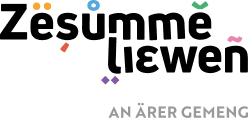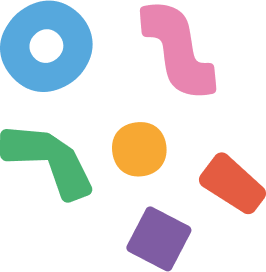The best practices presented below are concrete measures that can be implemented to promote intercultural living-together at the local level. They can be adapted to different contexts and reproduced in all Luxembourg municipalities.
Best Practices
Charter for living together
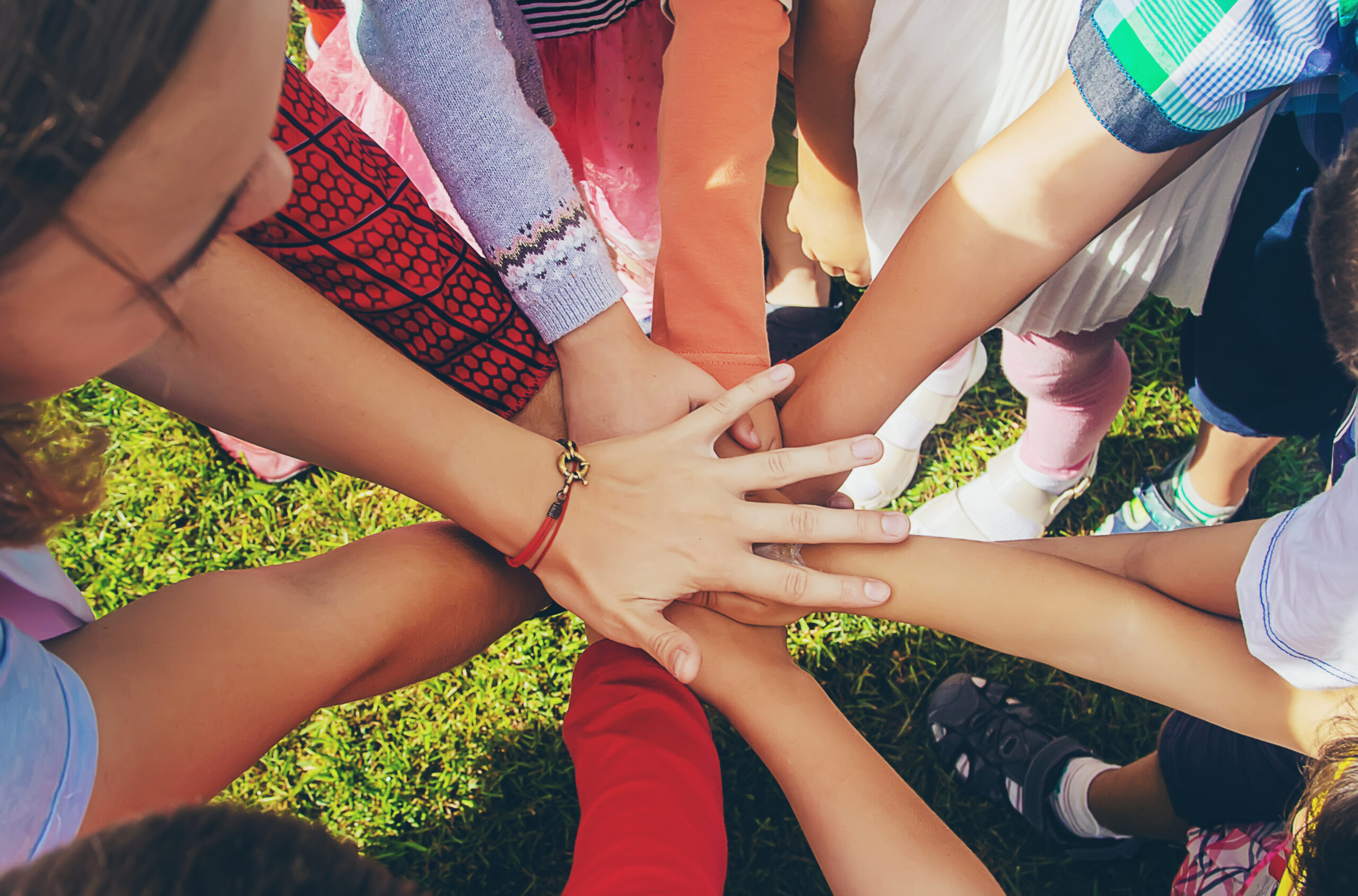
Childcare/activities for children during participatory and/or volunteer events
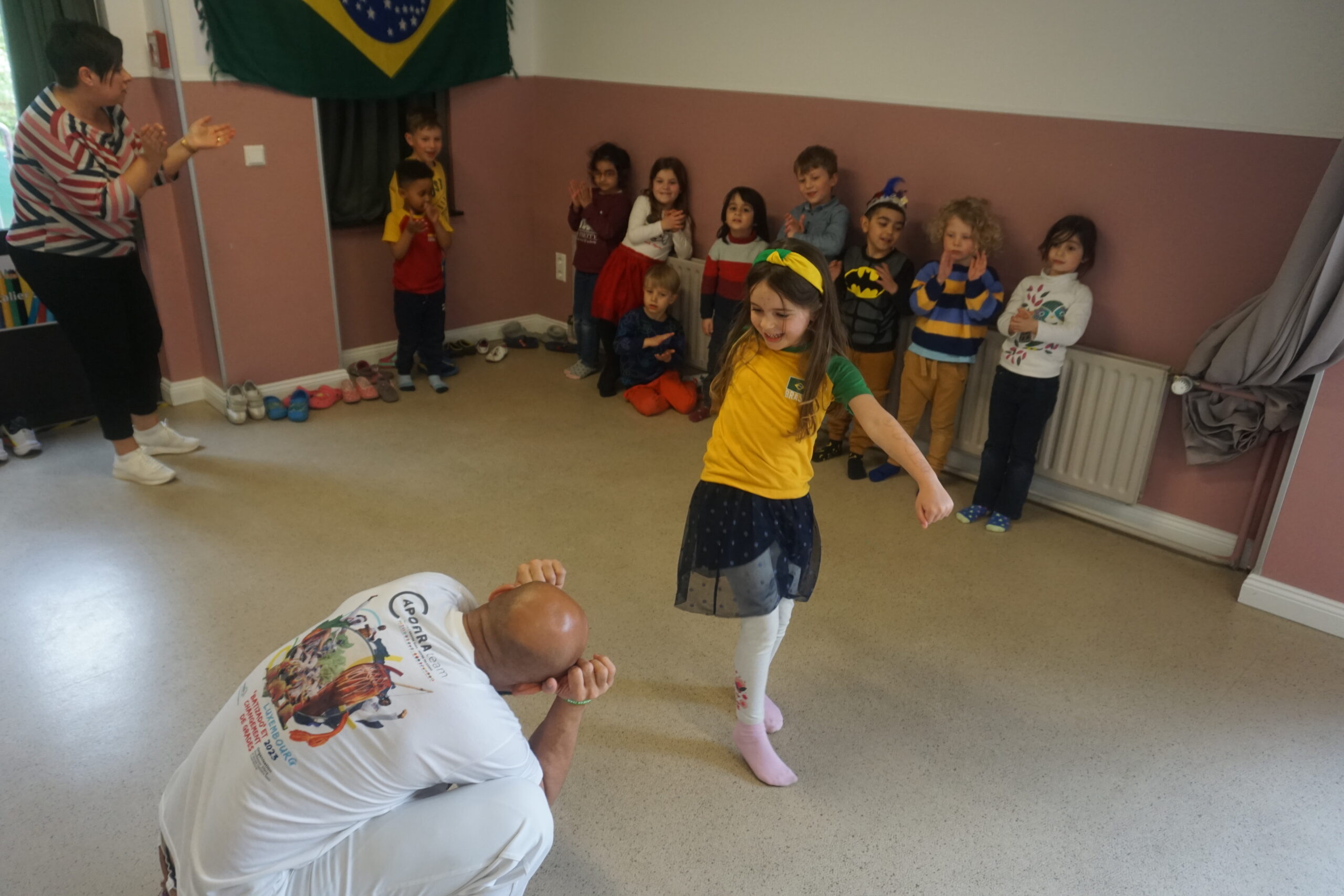
Citizen workshop
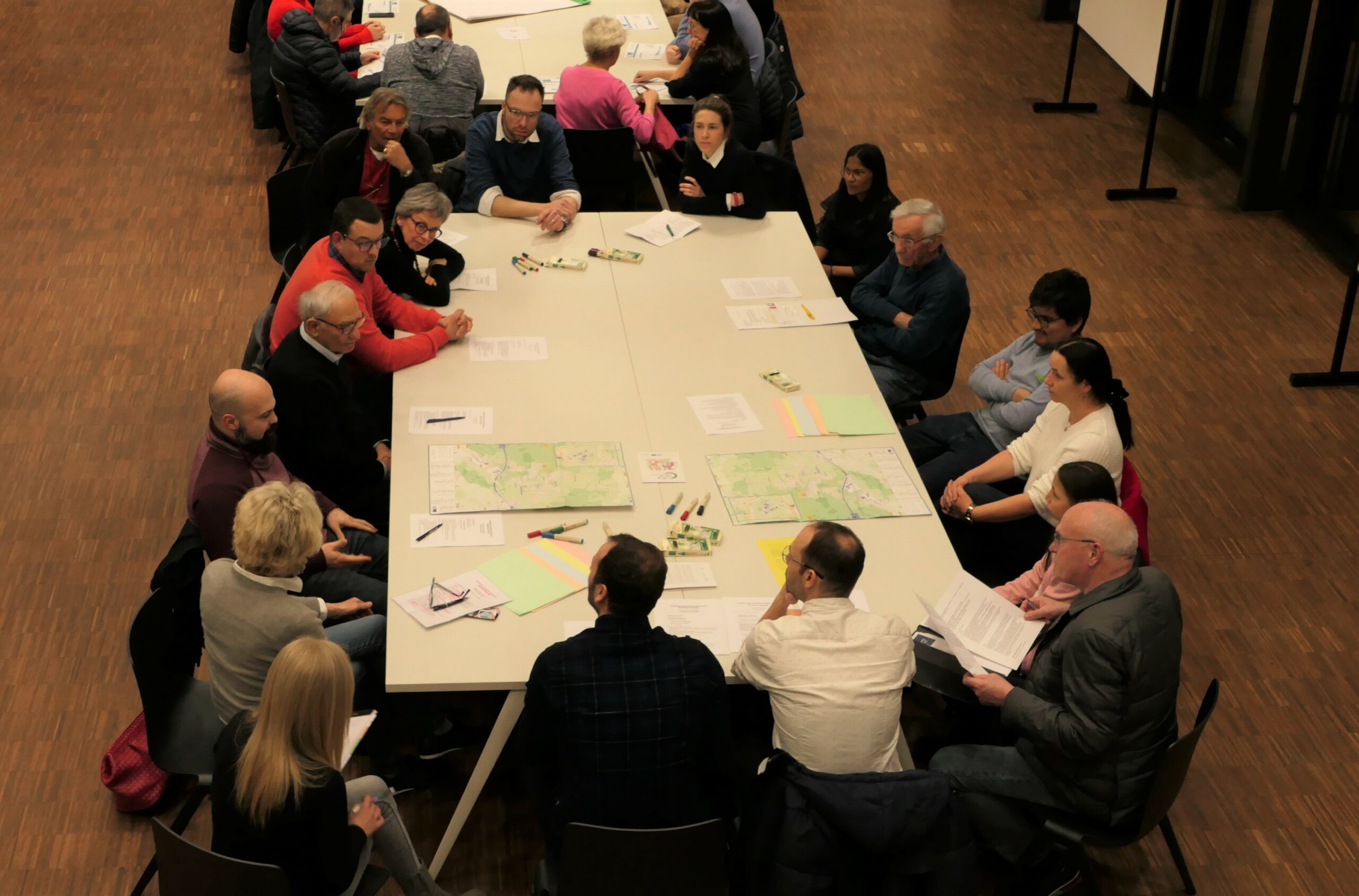
Citizens’ consultation hour

Community garden
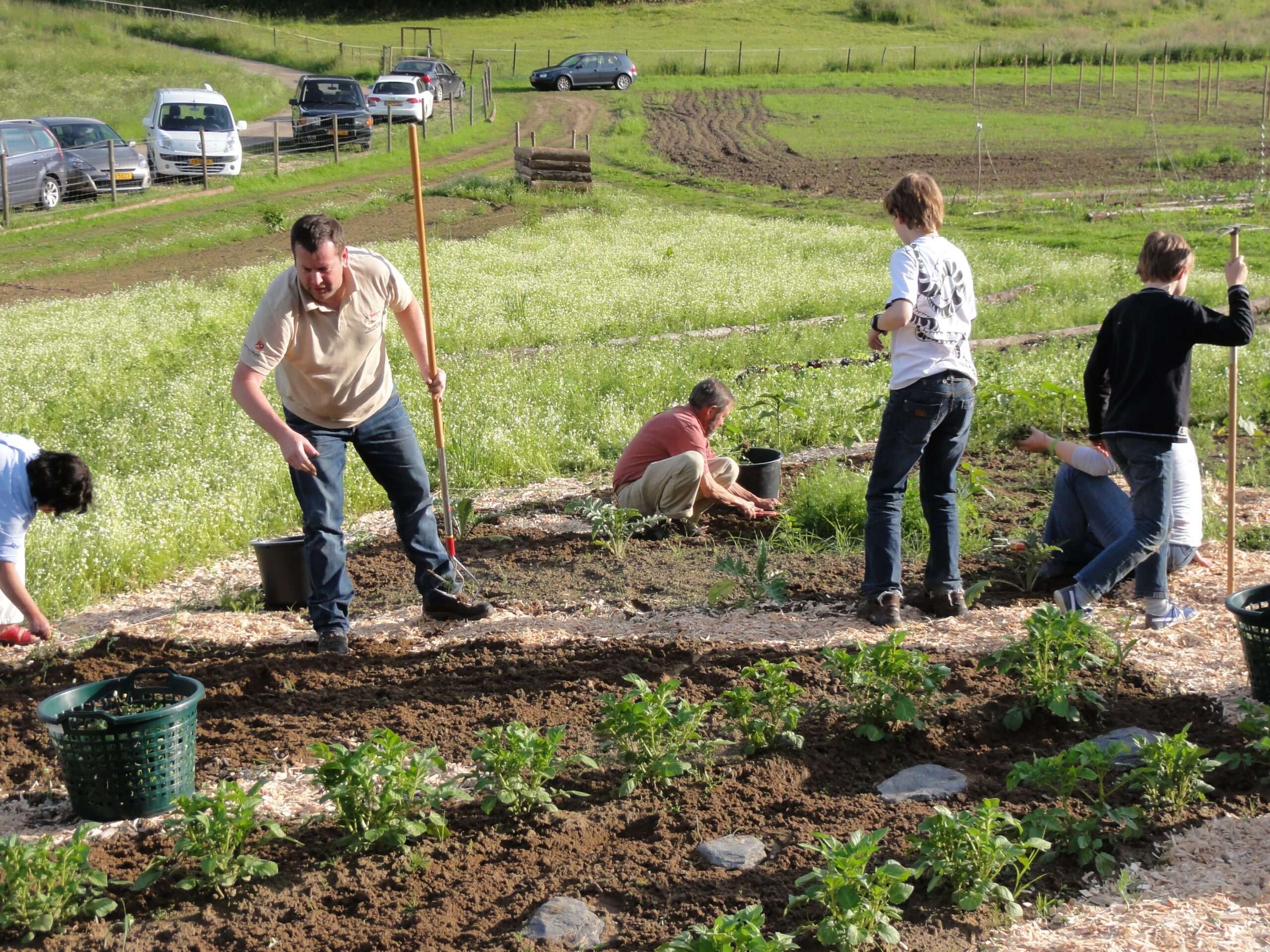
Conference on racism and the fight against all forms of discrimination
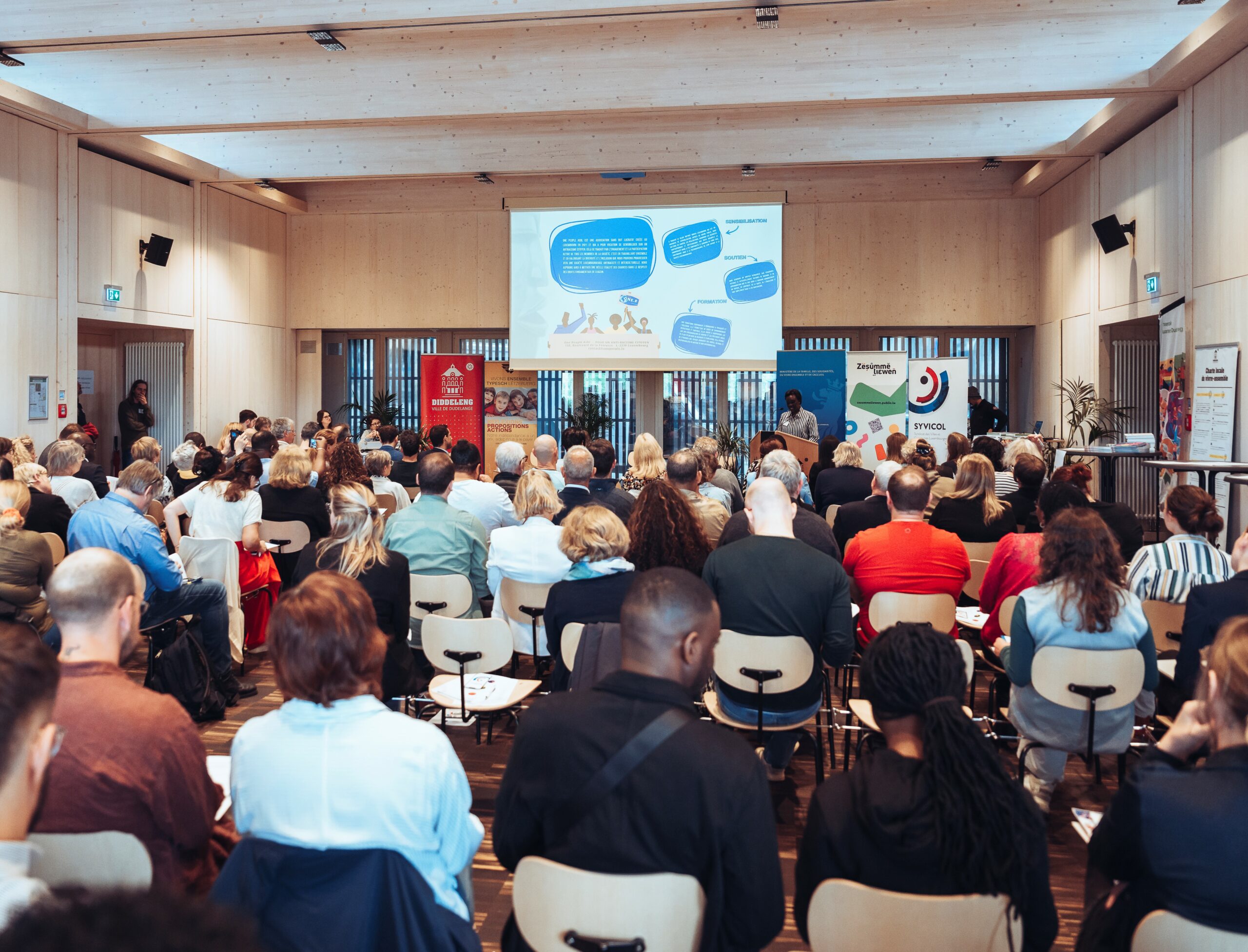
Cultural workshops in an Education and Care Structure (ECS)
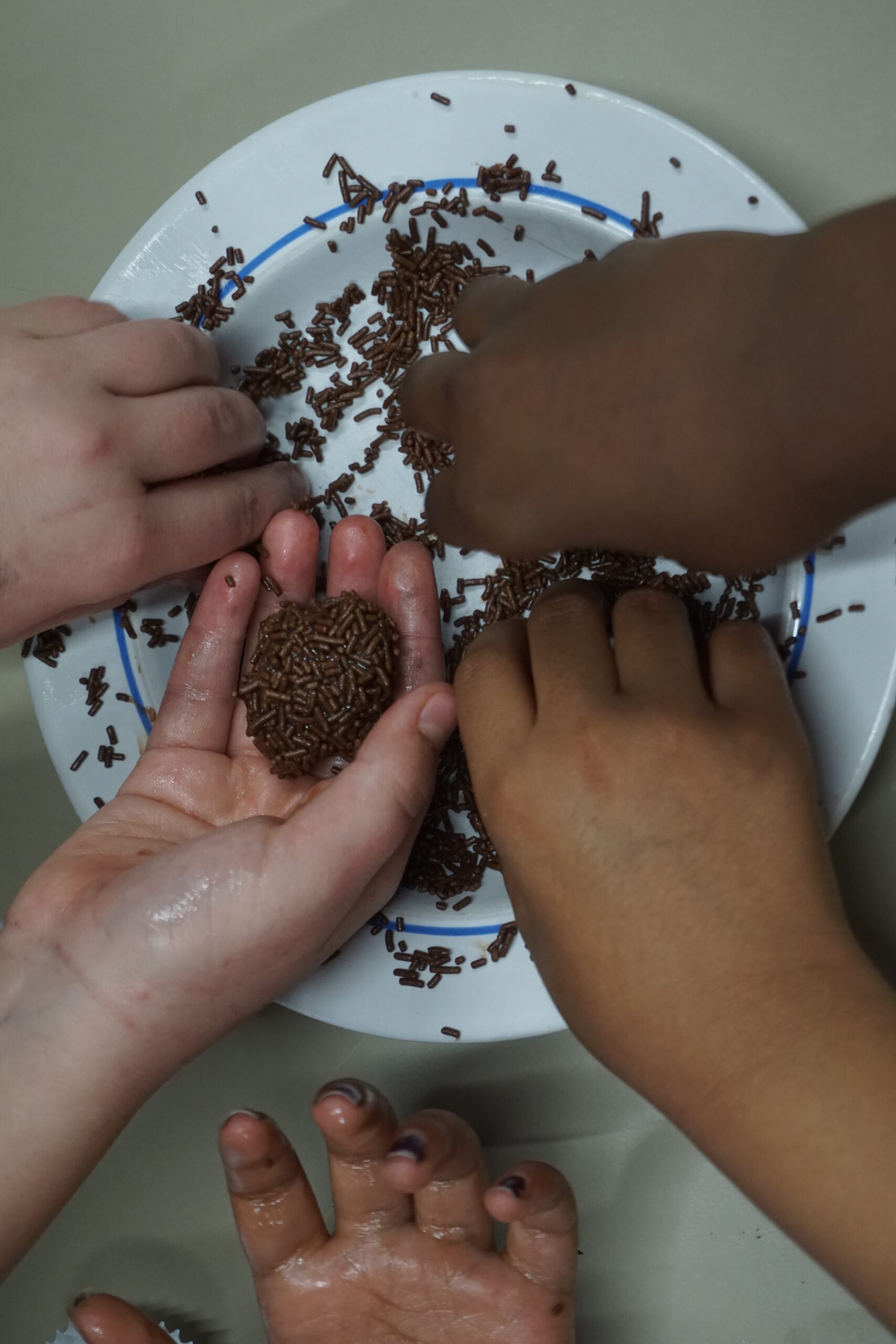
Digital platform for citizen participation

Discover your municipality – for kids
Distribution of pencils of various skin colours

Educational landscape
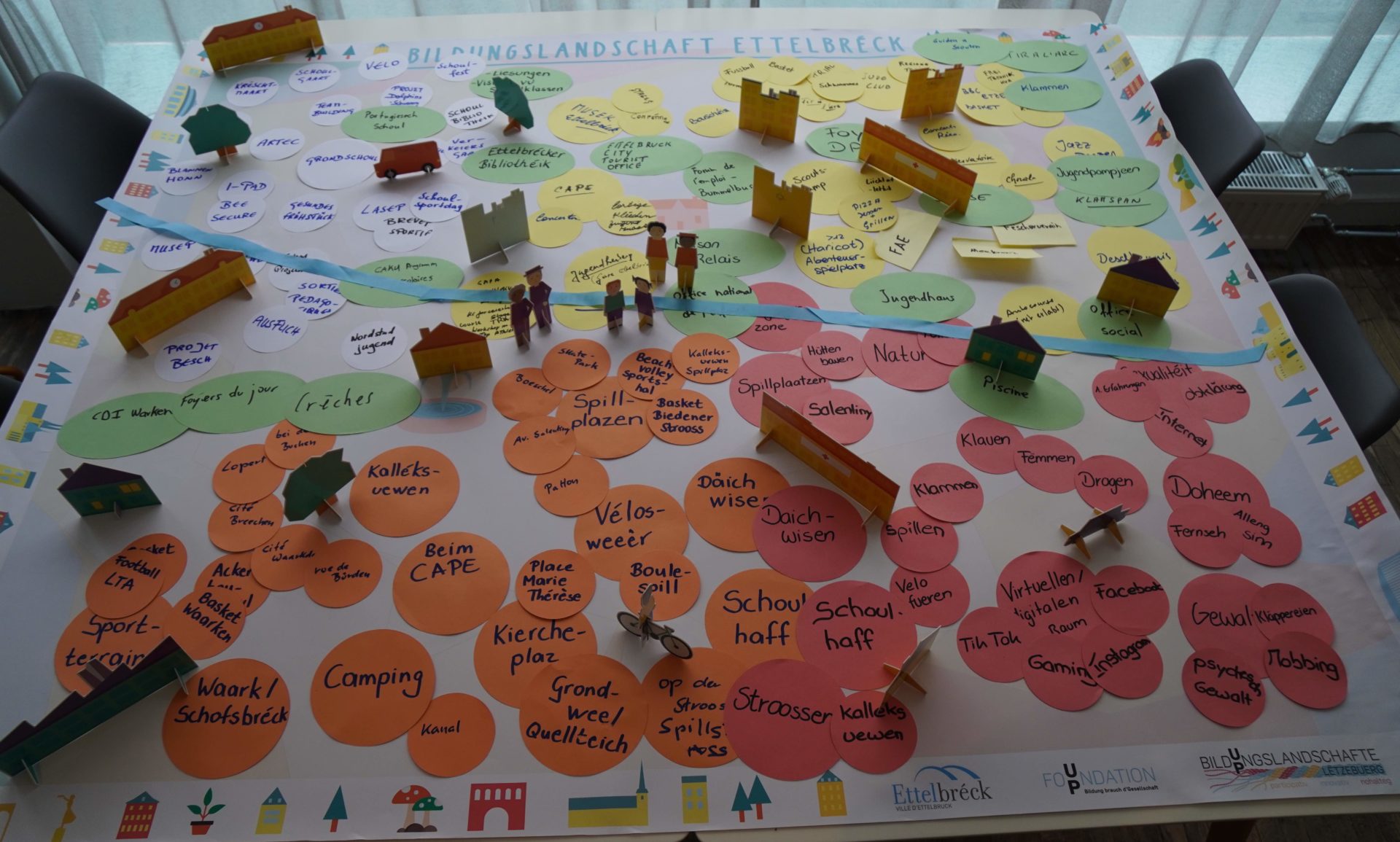
Electoral Meet & Greet
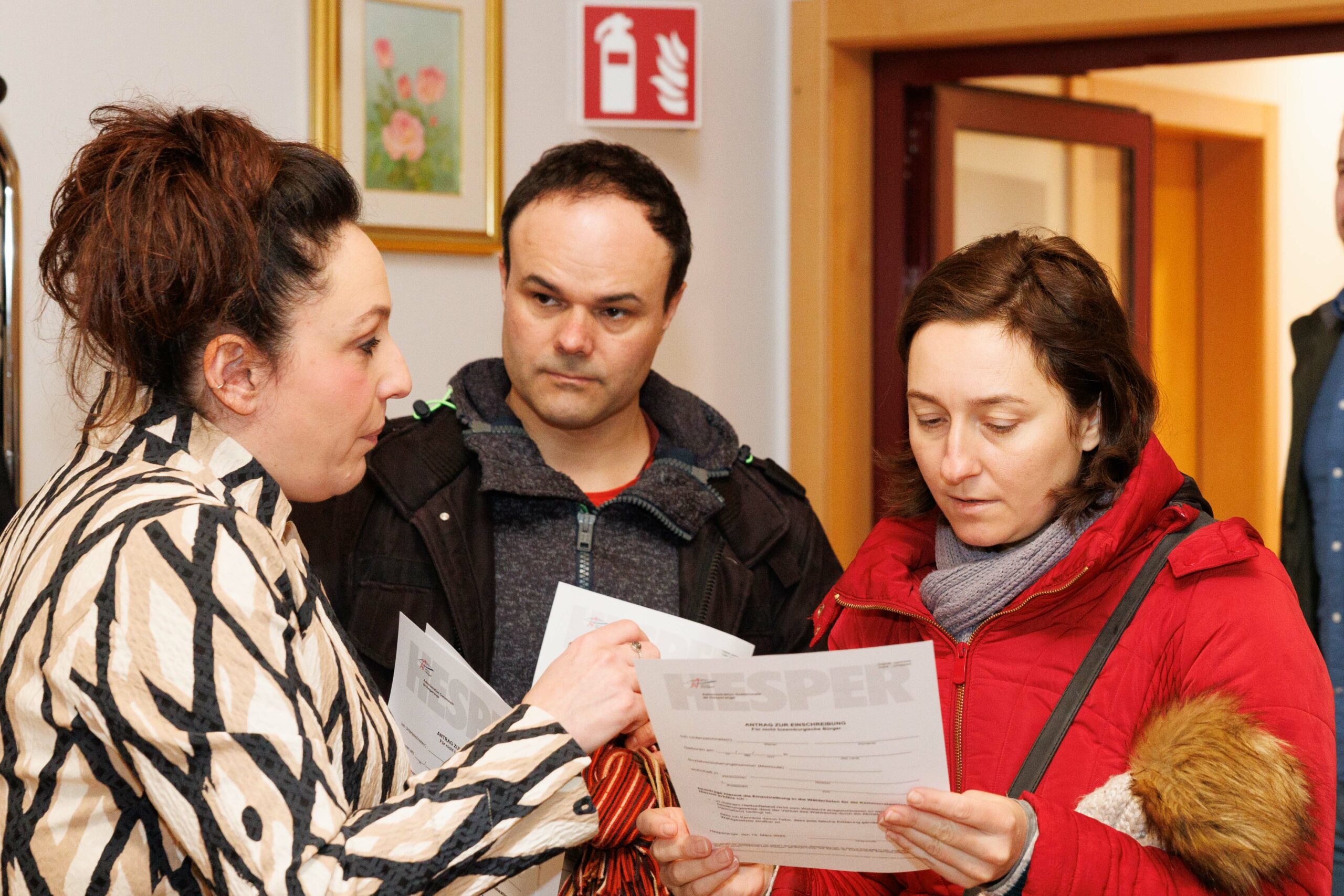
Festival of Cultures
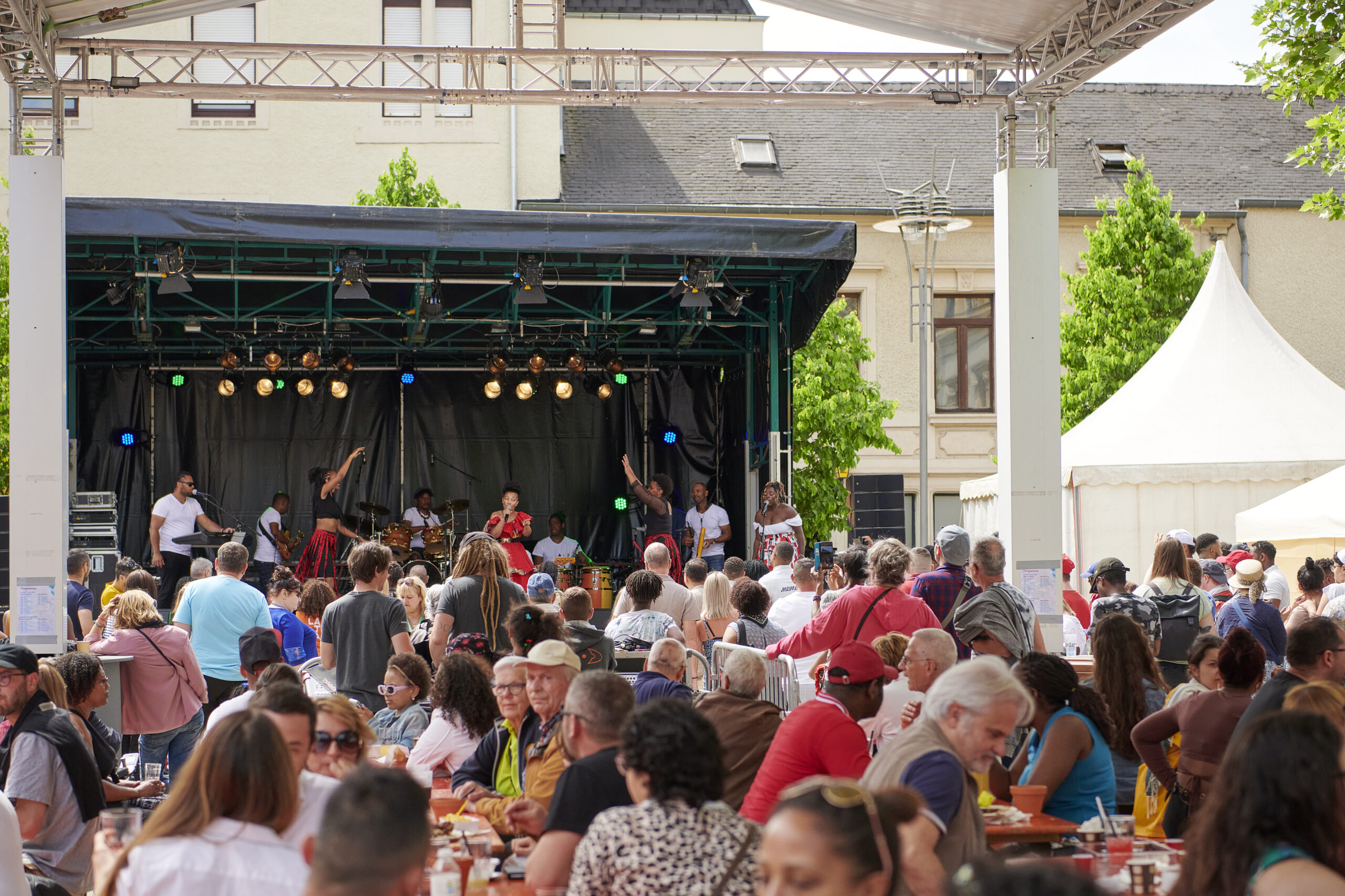
Grouss Botz’ community volunteering
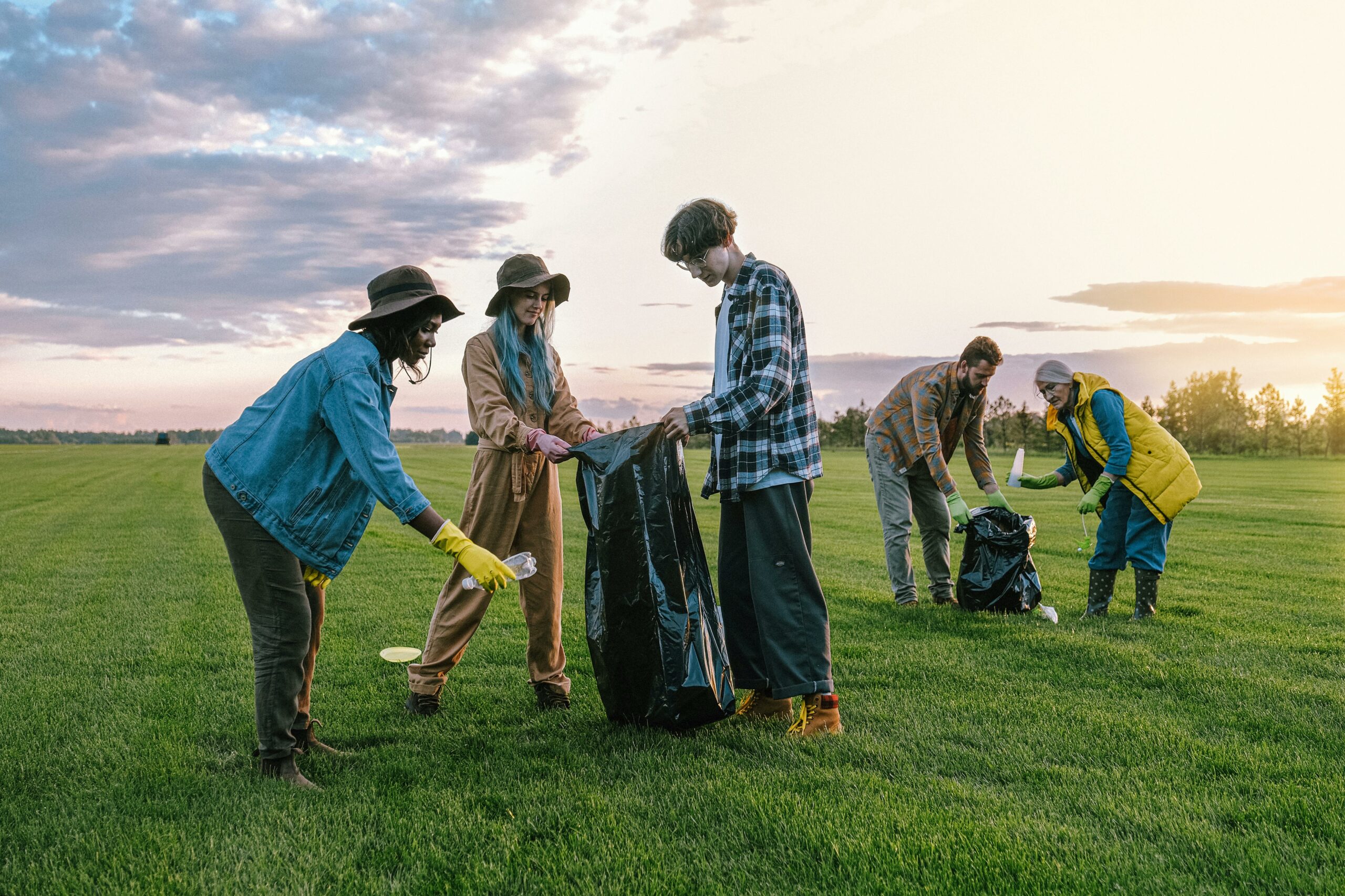
Hosting of a refugee accommodation structure in Schimpach
Intercultural “afterwork” drinks
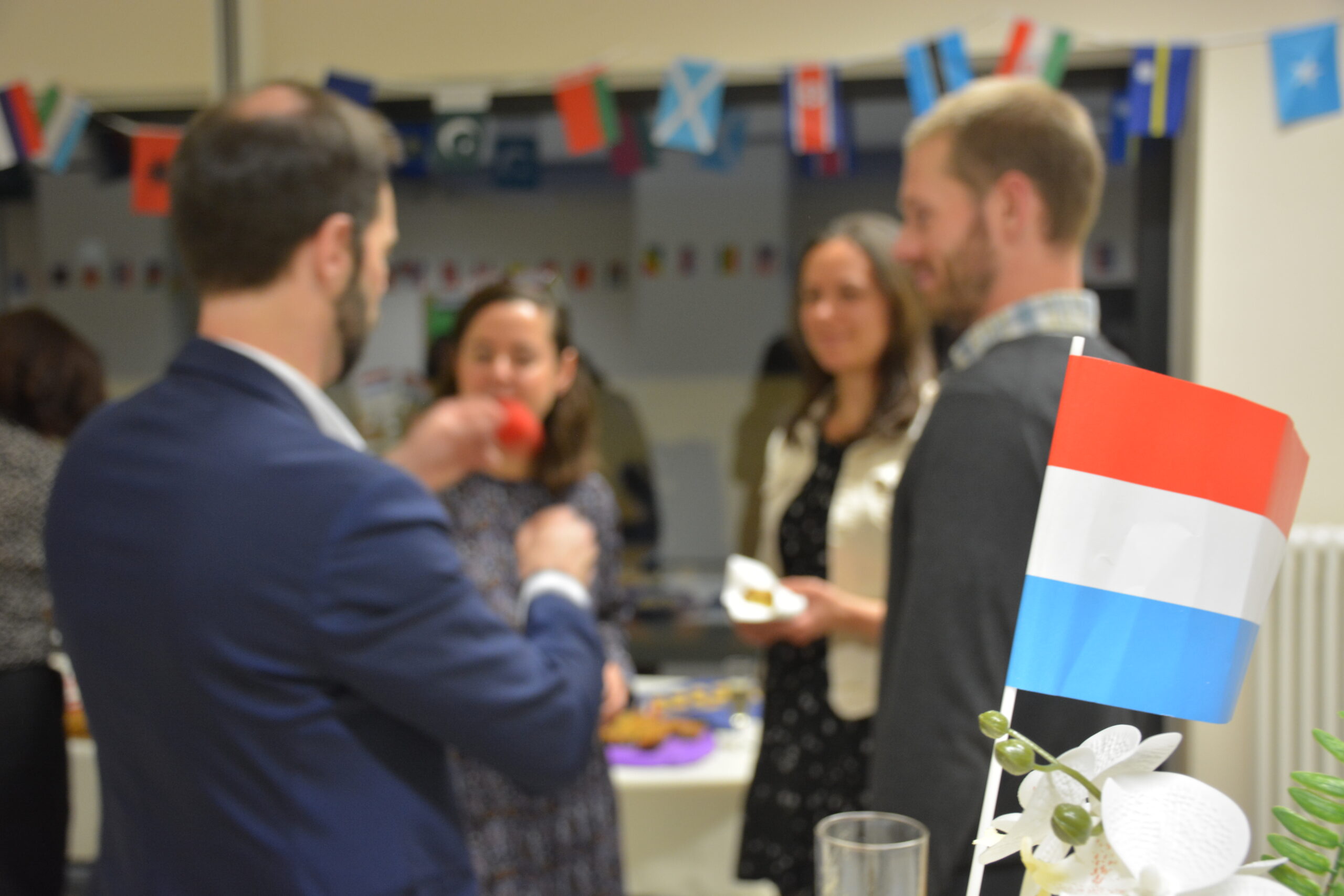
Language Café
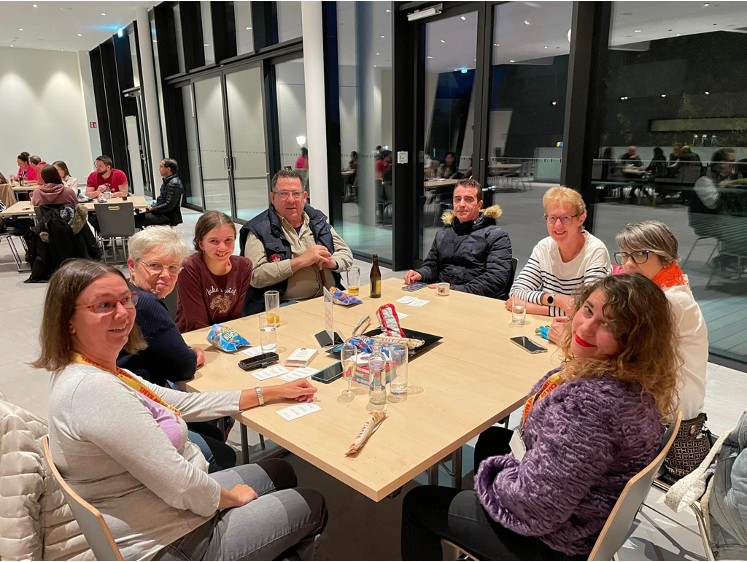
Living Library
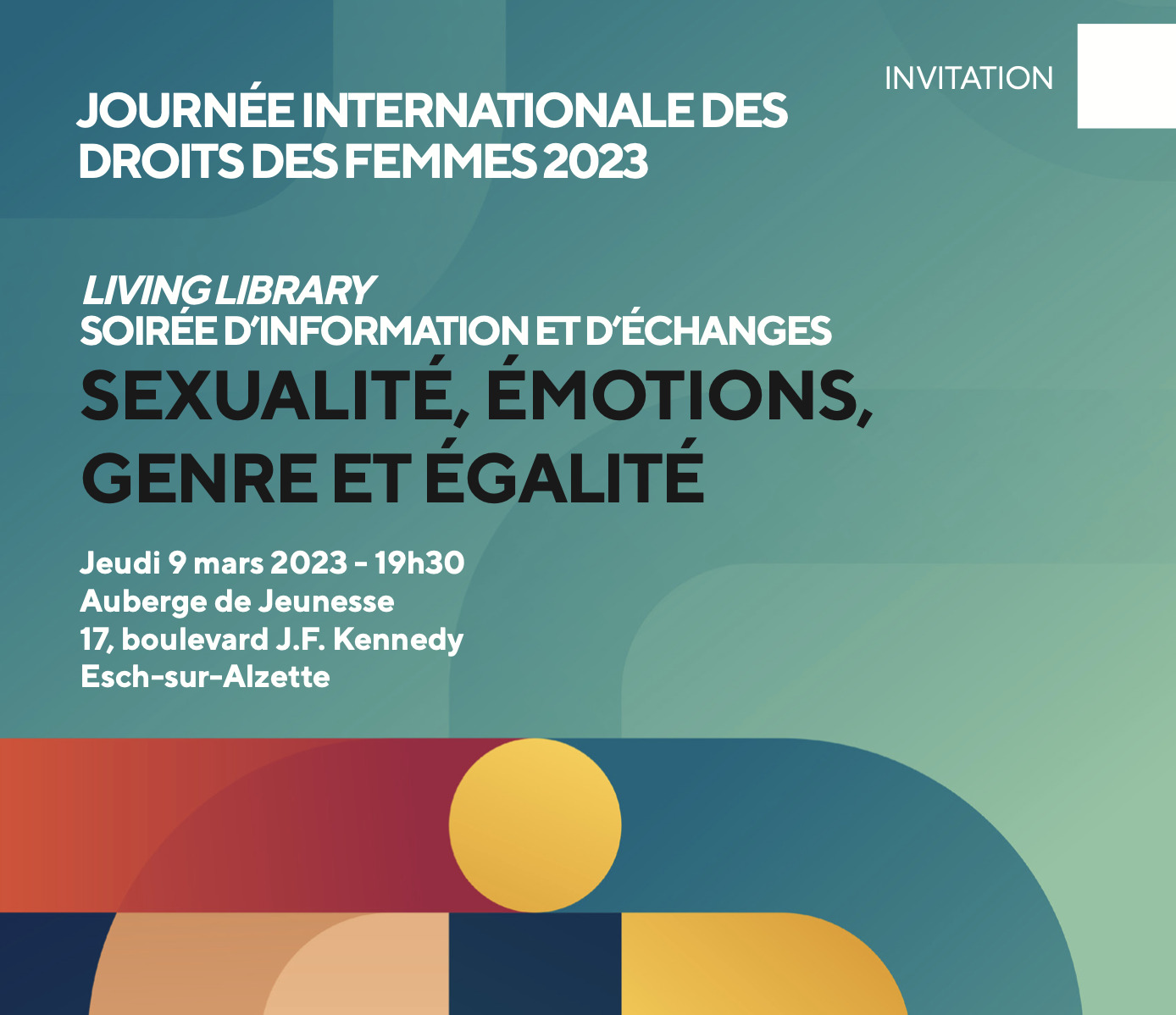
Mentorship Program for Children
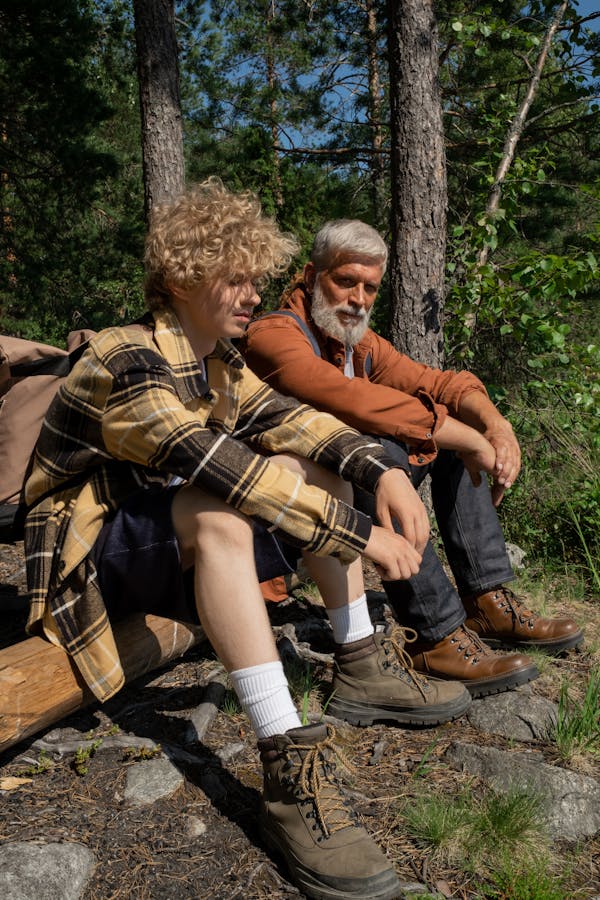
Municipal Tour ("Tuer vum Duerf")
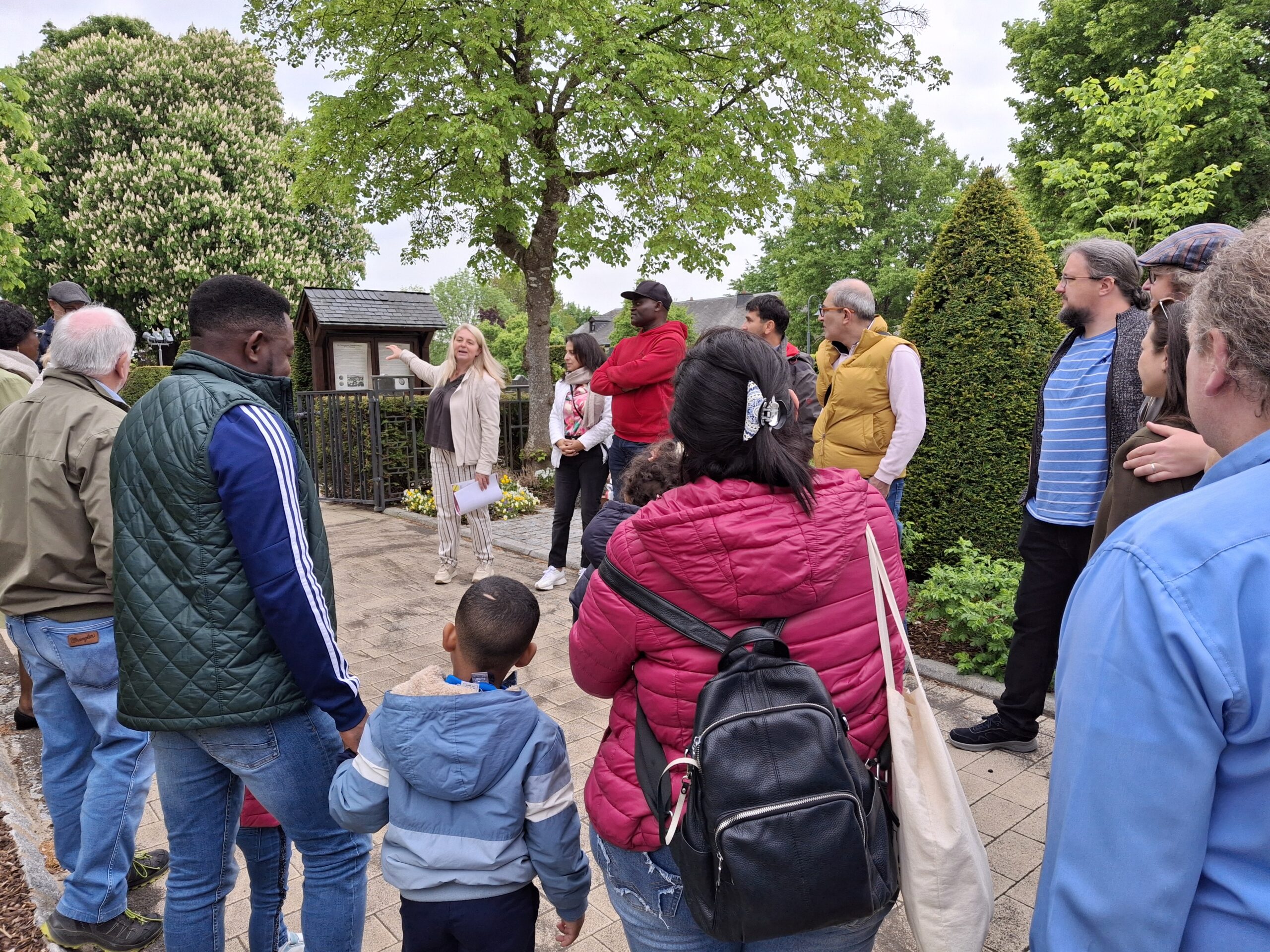
Neighborhood App
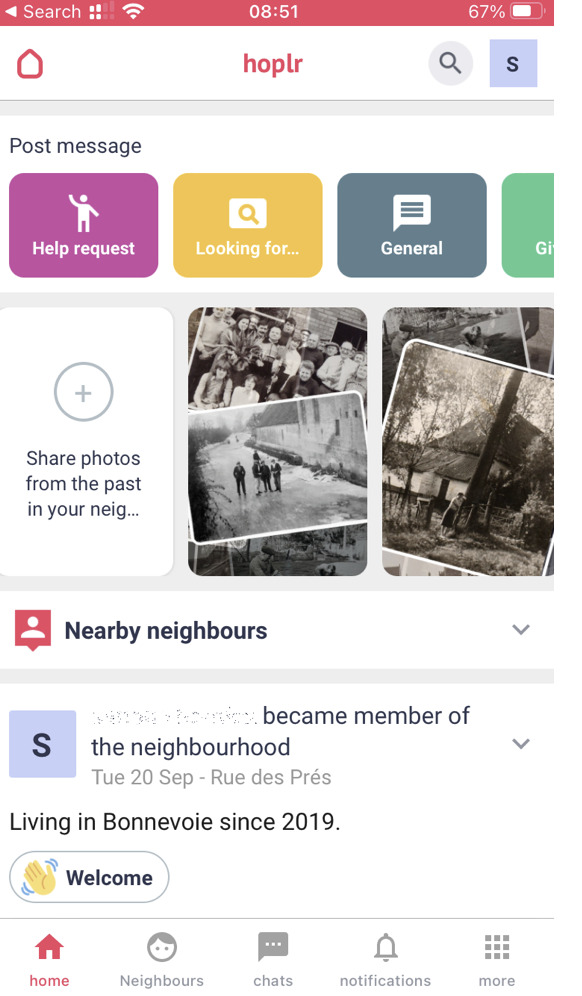
Neighbourhood day
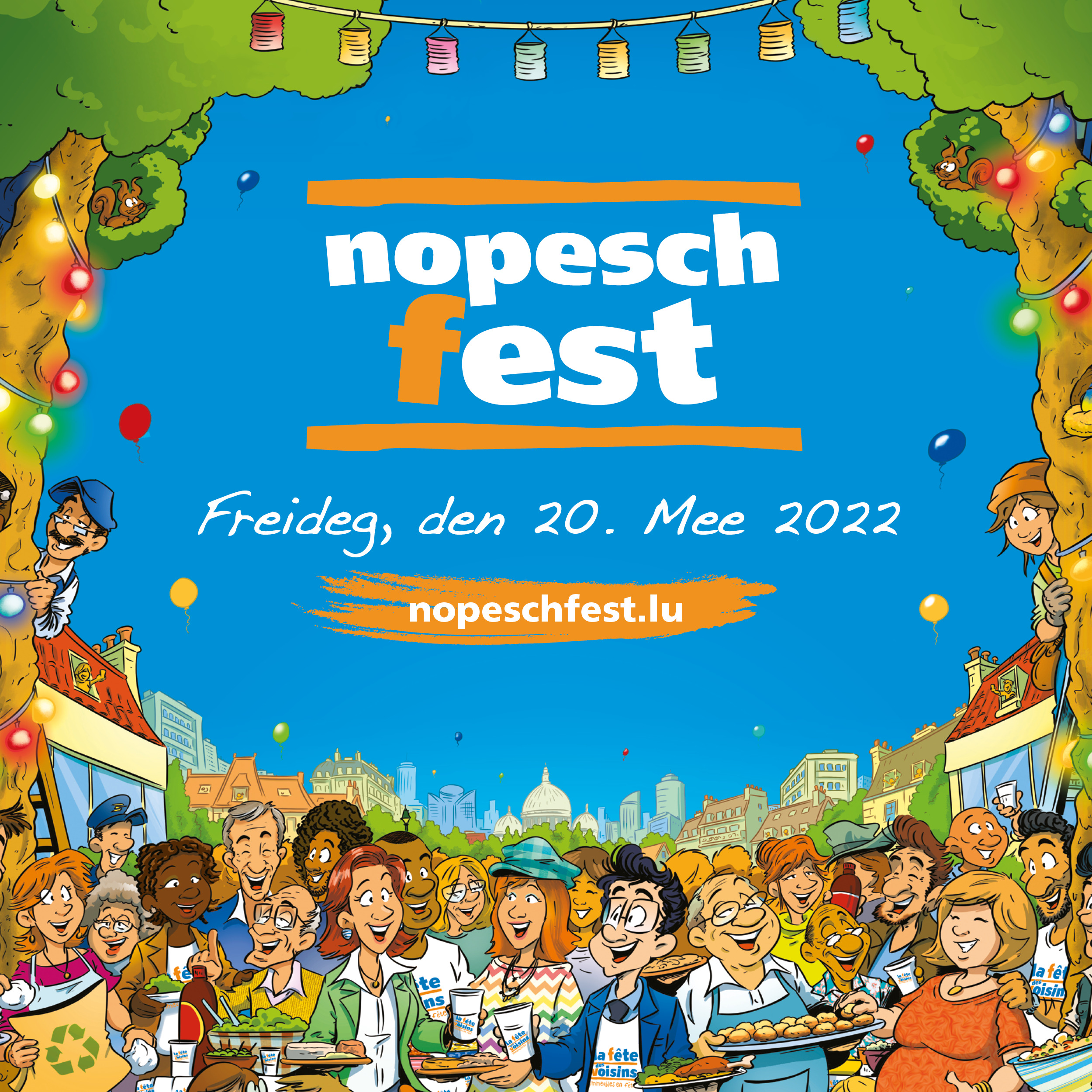
Participatory budget
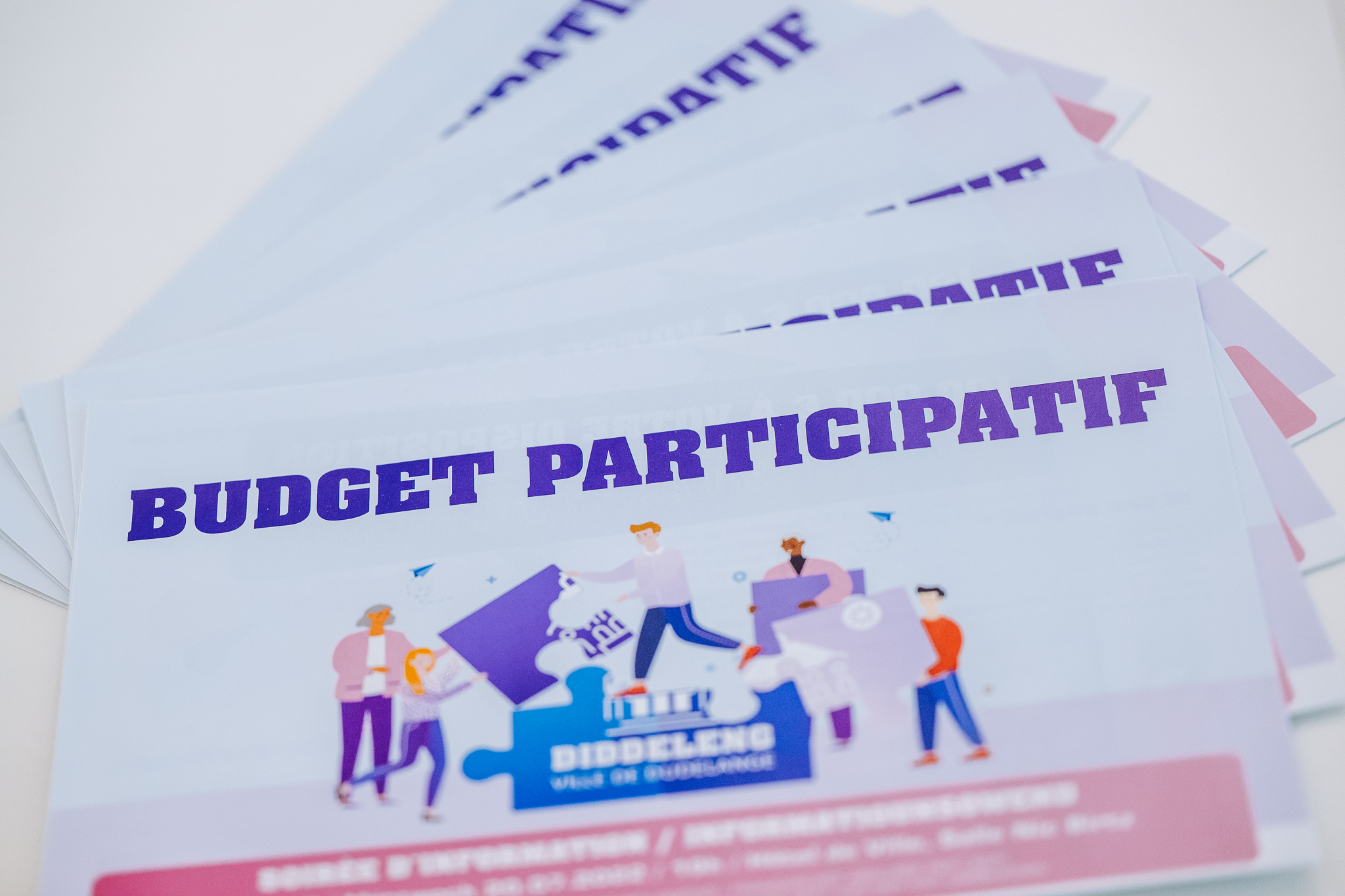
Political participation: live broadcasts of municipal council meetings
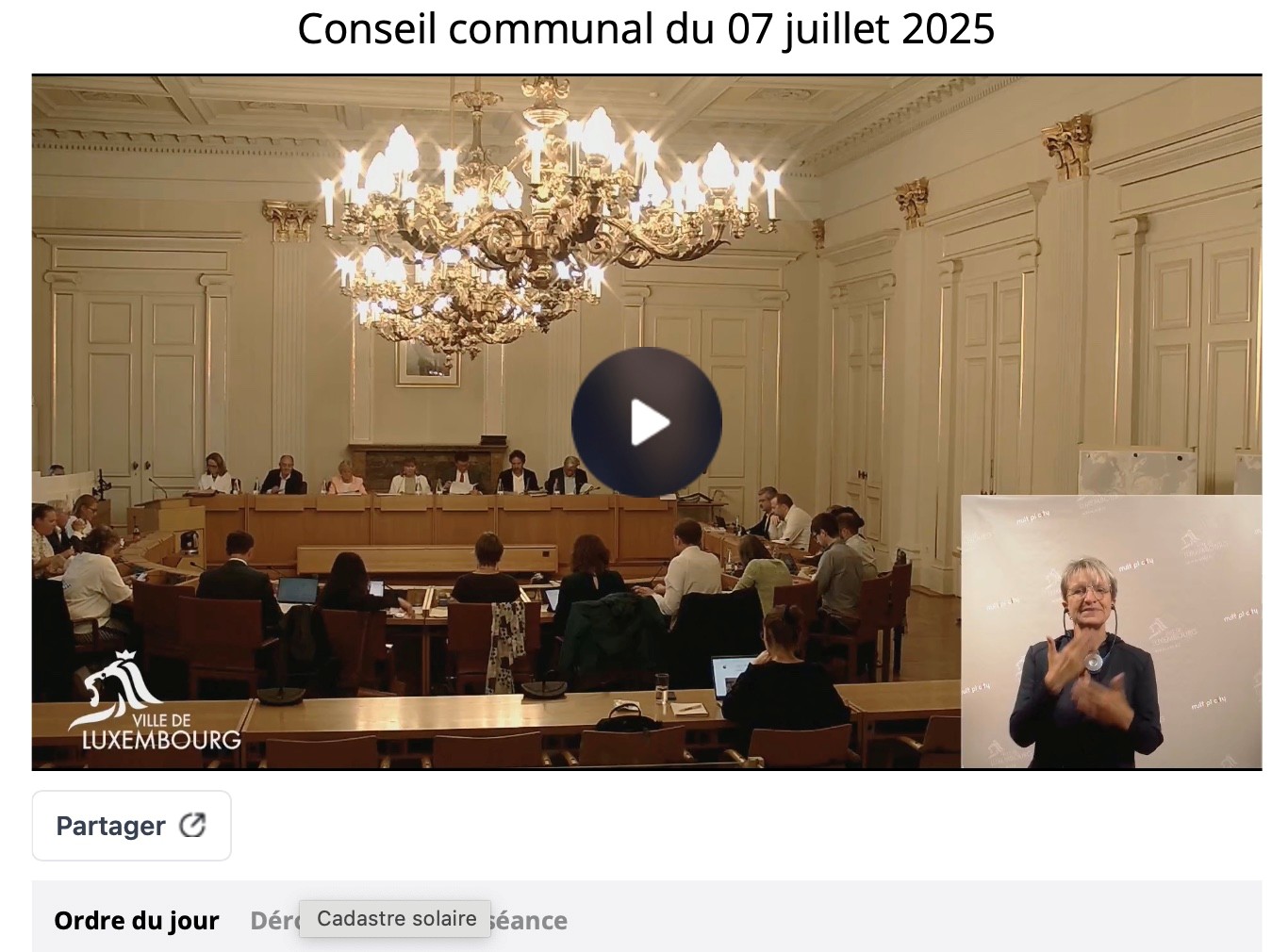
Public Writer
QR code translation
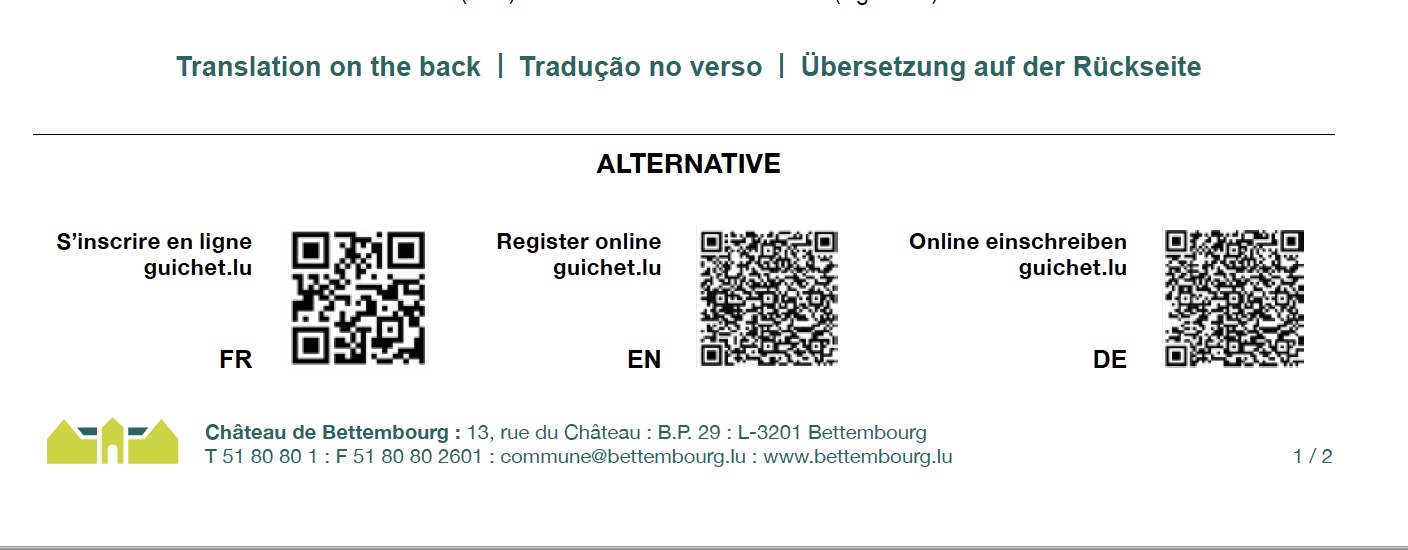
Senior Plan
The municipality presents itself (“La commune se présente”) – Strassen
Theme Month (living together, racism, diversity, etc.)
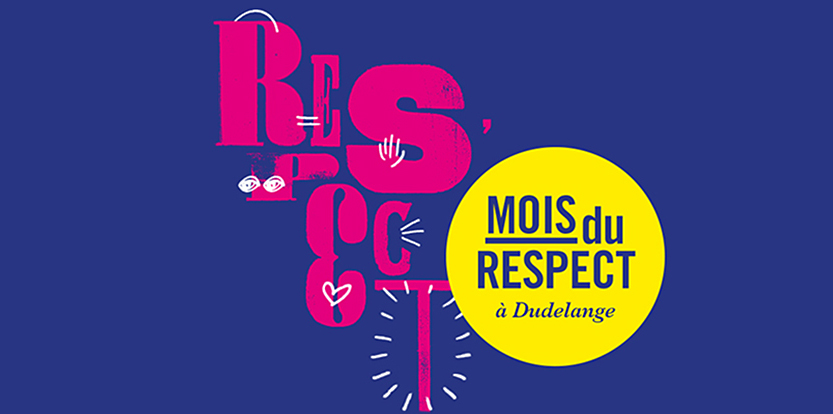
Third Place (Citizen House)
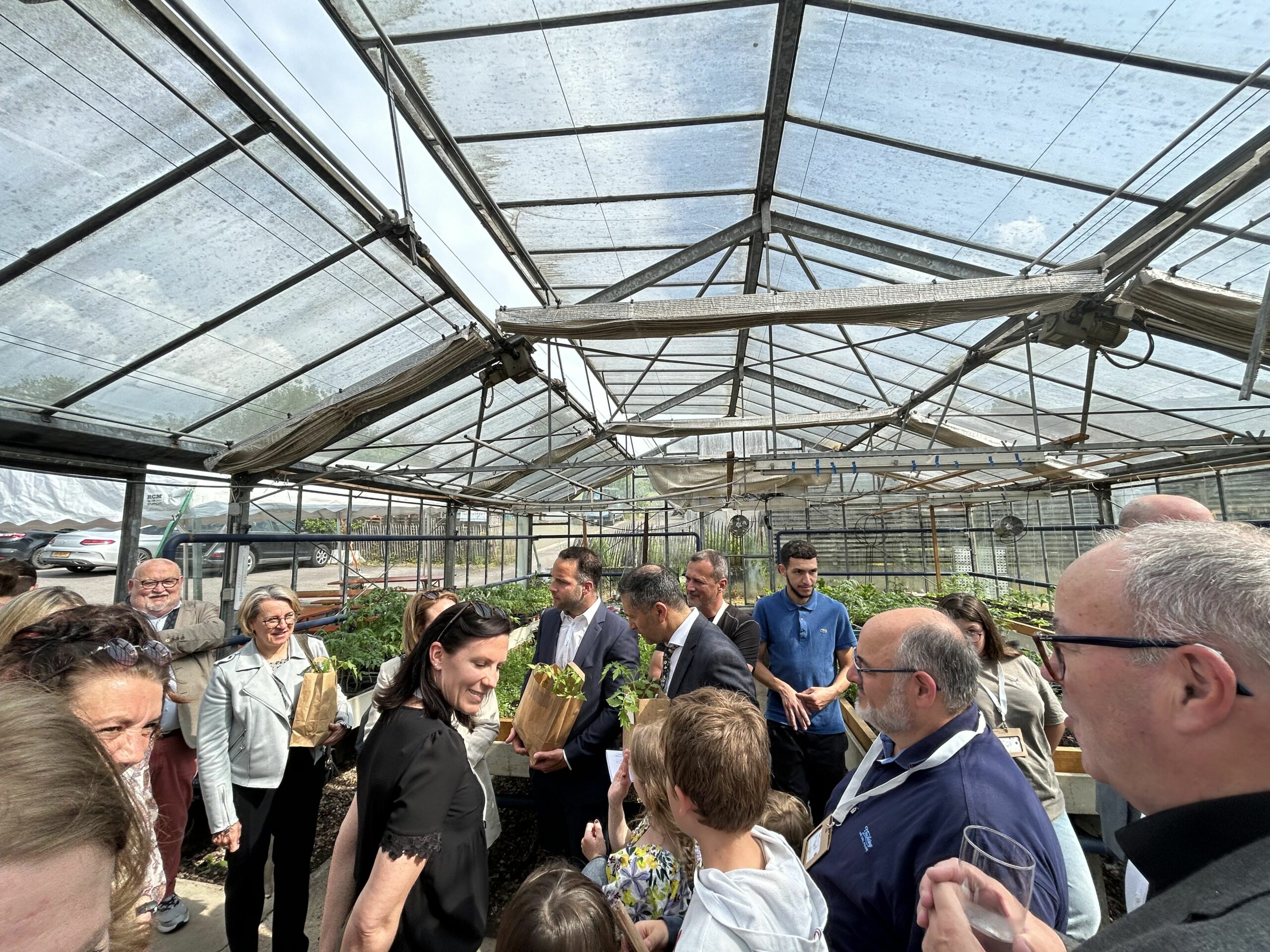
Training for municipal agents – micro-aggressions

Welcome brochure
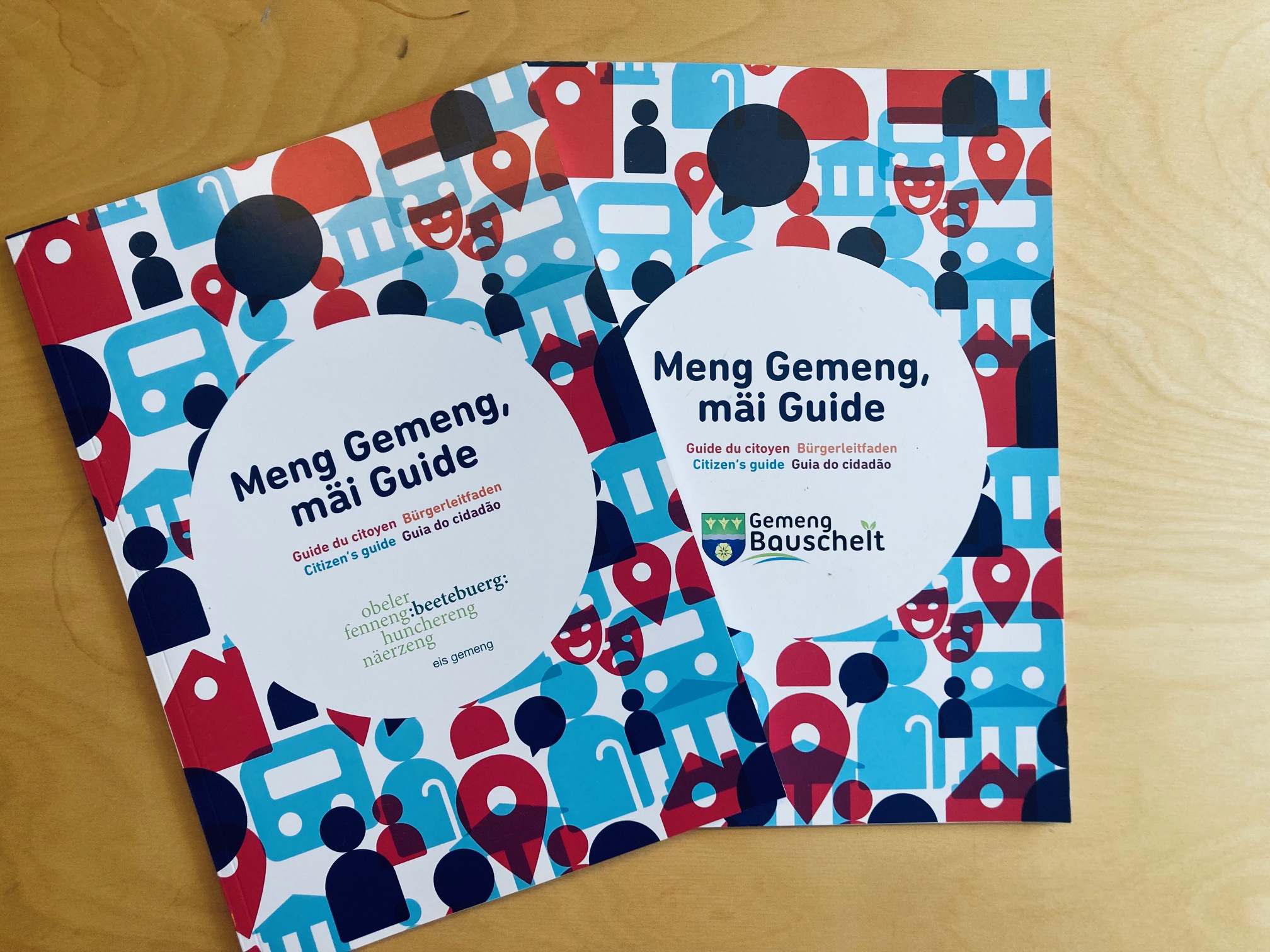
Welcome Day Liewen zu Esch
Welcome Event for Newcomers
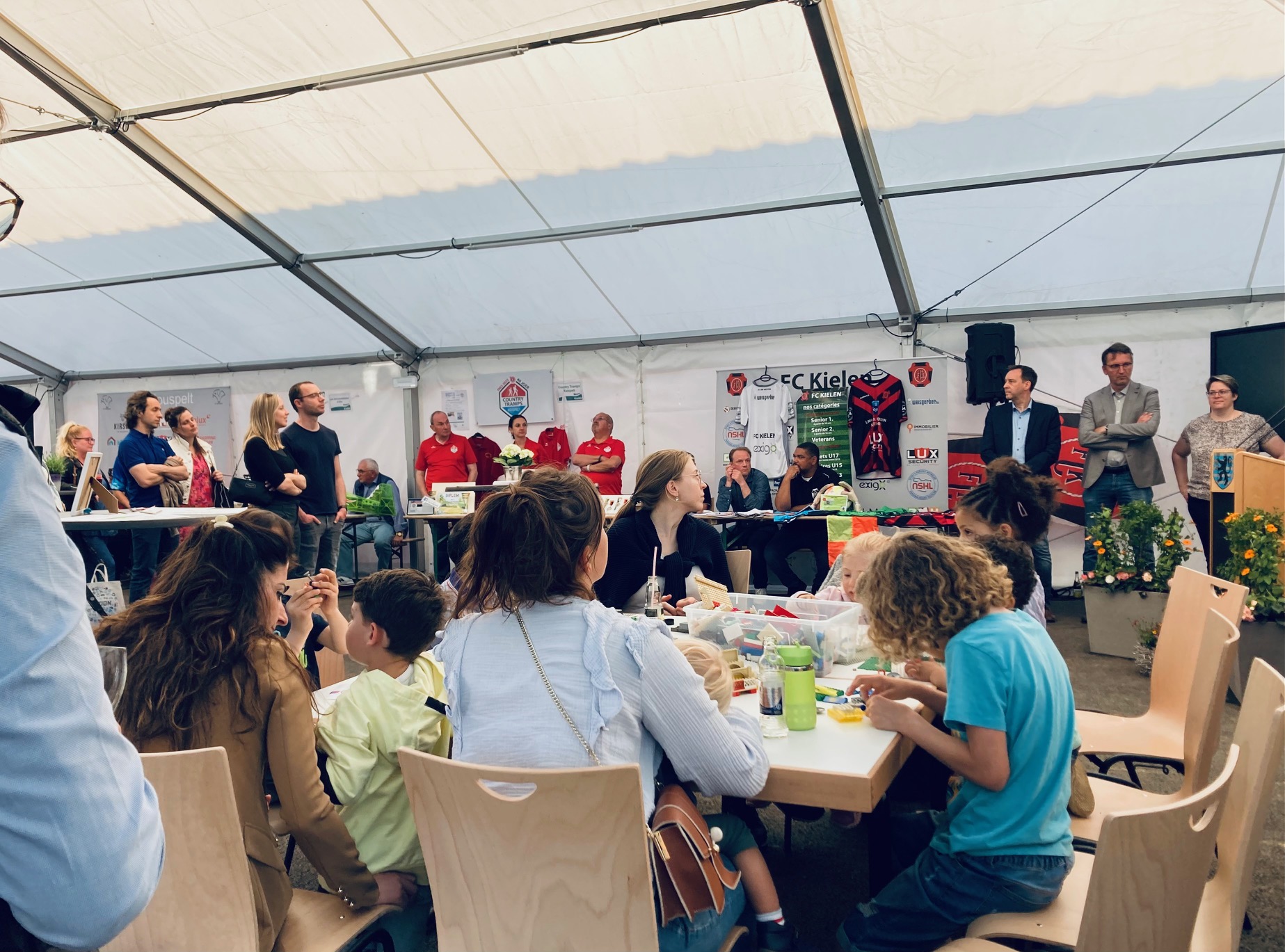
Welcome to Wiltz („Gutt Ukommen zu Wooltz“)
Welcome and orientation
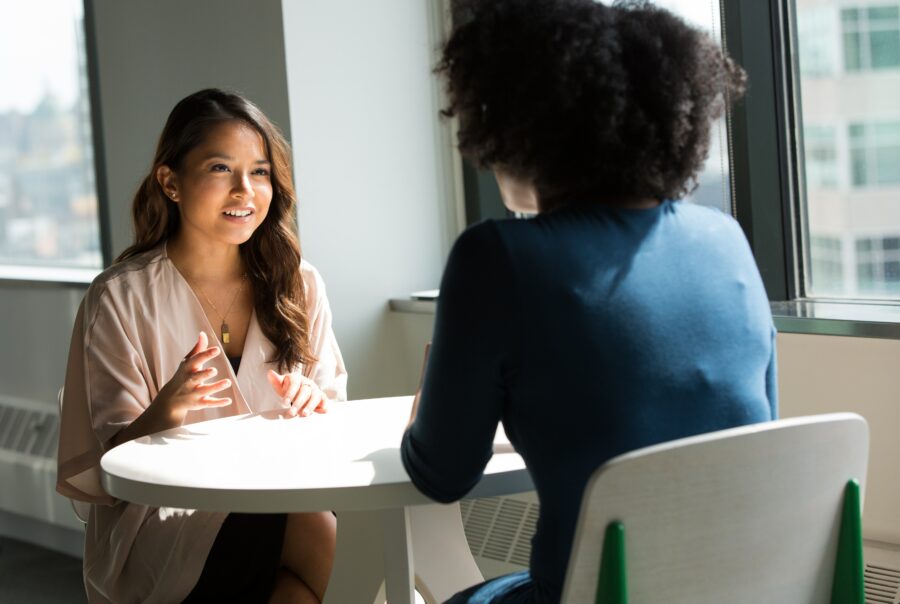
Living-together in municipalities starts with a quality welcome and orientation for new residents. Transparent, multilingual communication and systematic information sharing help residents to feel "at home" and get actively involved in the social, cultural and political life of the municipality.
- Welcome brochure
- Welcome Event for Newcomers
- Municipal Tour ("Tuer vum Duerf")
- Public Writer
- Discover your municipality – for kids
Languages, education and training
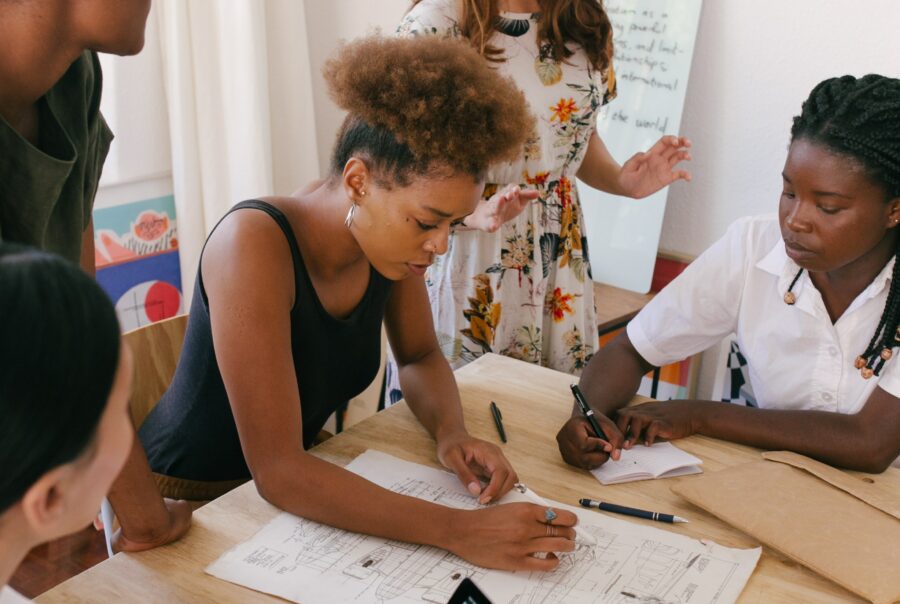
Providing citizens with the opportunity to learn and/or practice a language increases their chances of actively participating in local life. Combined with a range of training courses on subjects related to interculturality, municipalities can create a living and working environment that promotes inclusion and living-together.
Political and civic participation
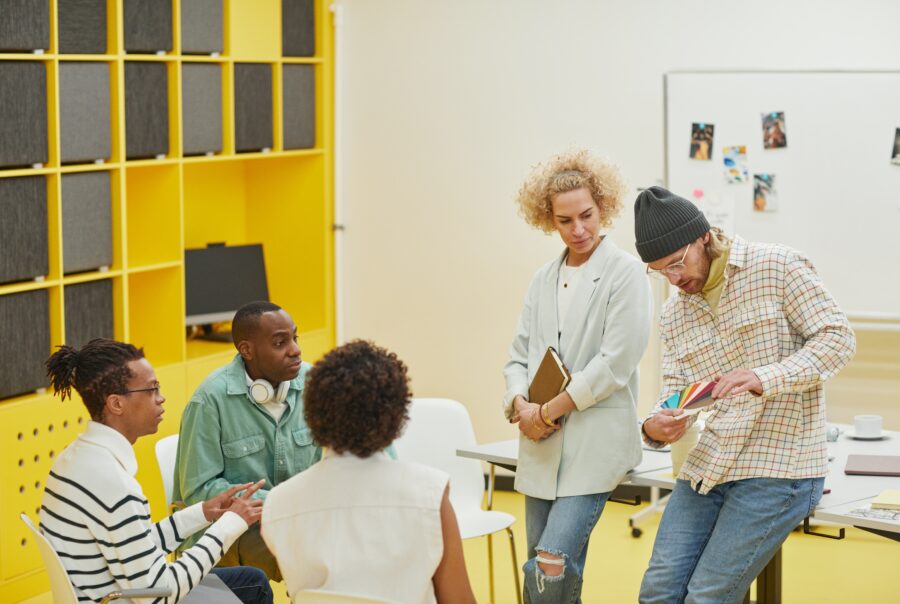
Encouraging citizens to take an active part in local decision-making should not be limited to informing them of their right to vote. The provision of citizen training and discussion platforms, and the funding of citizen-led projects, are just as important in enabling everyone to participate.
- Citizen workshop
- Charter for living together
- Political participation: live broadcasts of municipal council meetings
- Childcare/activities for children during participatory and/or volunteer events
- Electoral Meet & Greet
- Participatory budget
- Digital platform for citizen participation
- Citizens’ consultation hour
Volunteering and intercultural encounters
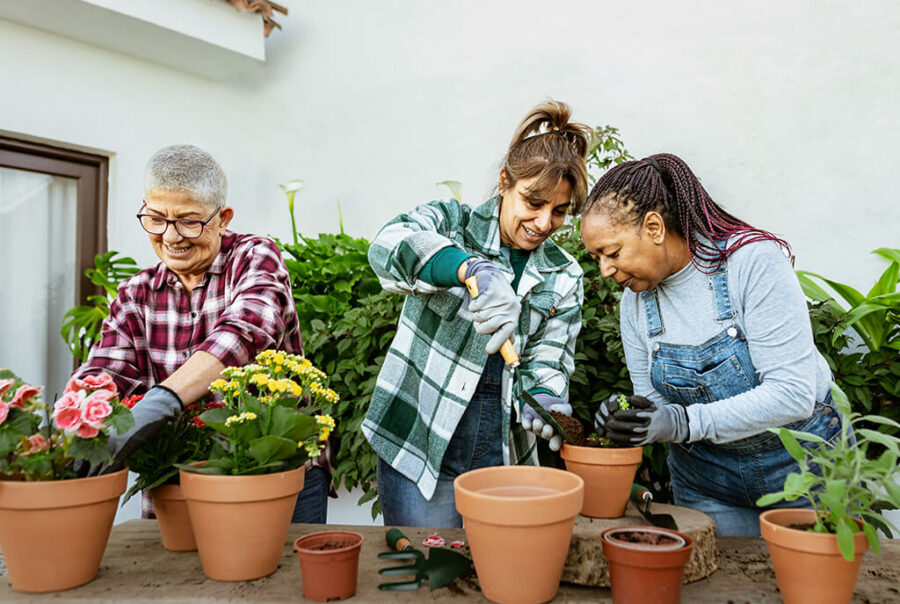
Creating spaces to celebrate diversity is an important factor in living-together. Getting to know one's neighbours, building networks, launching joint activities in "third places": this is how citizens move from being "guests" to being "hosts", and get involved as volunteers in local activities.
Diversity and the fight against discrimination
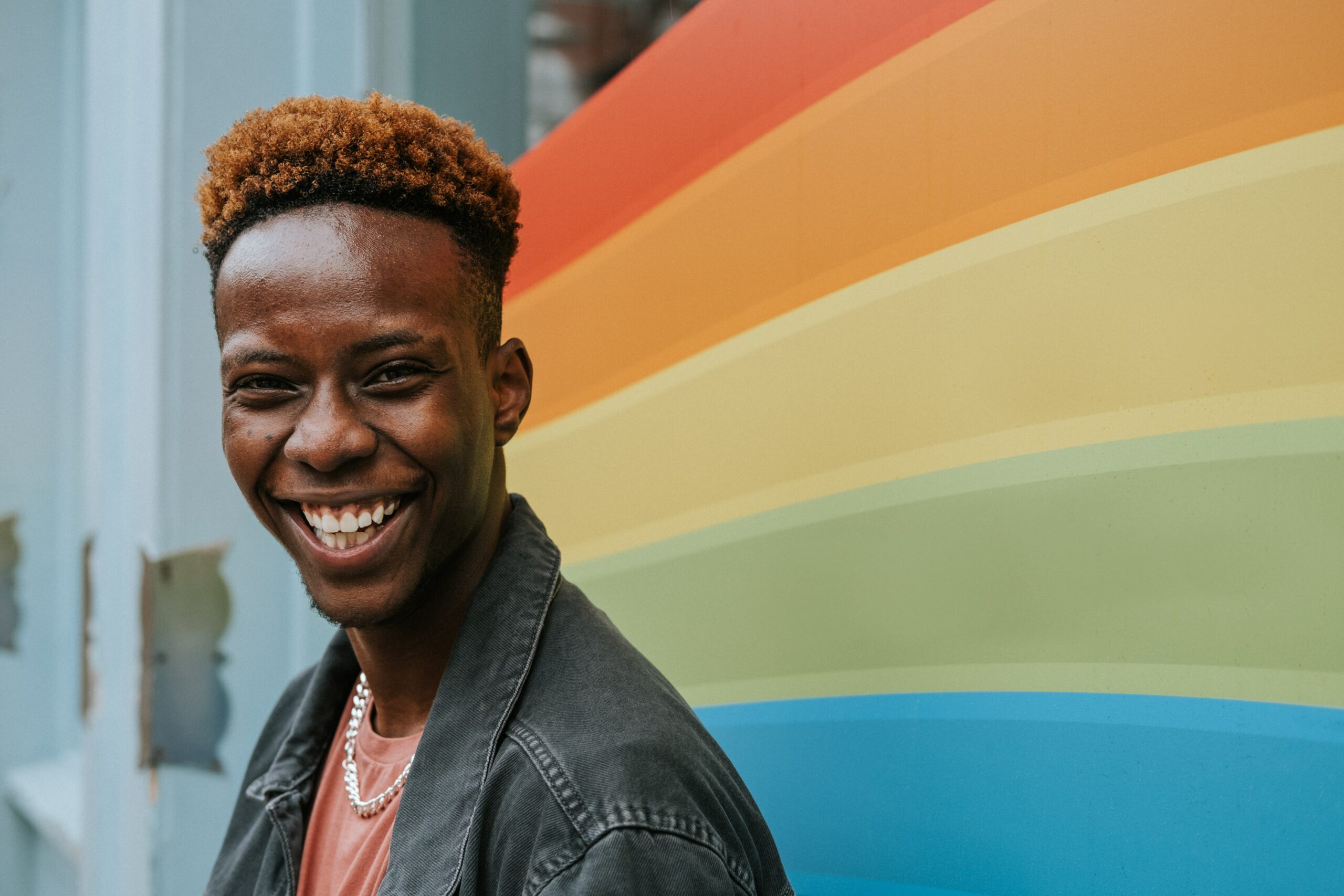
Intercultural living-together is based on mutual respect and solidarity between all citizens, regardless of age, gender, culture, religion or ethnicity. By setting up mediation structures, racism prevention programmes or inclusion projects, municipalities can establish diversity as an asset, thereby promoting social cohesion.

Charter for living together
Quality of life and living together well are values to be promoted in our municipalities. Each generation has its place and everyone is welcome. A local charter for living together well can be drawn up to support the implementation of these values, living together and mutual understanding.
Ideally, the content of the charter is gathered as part of a participatory process during which various advisory committees, municipal department managers and a panel of citizens and people working in the municipality are questioned about living together. The charter brings together the ideas of all these people on the art and manner of successfully living together in the community. Everyone must be able to feel at ease in the municipality, and to achieve this, everyone must contribute to living together in a respectful community.
Only together can we build the society we want to live in.
Every resident and worker is invited to sign this charter. A person’s signature symbolises their commitment to contributing to living together in peace. The charter can be offered for signature at various events, particularly those that open up a meeting space.
Objectives
- Promoting mutual respect
- Encouraging solidarity
- Strengthening social cohesion
- Fighting discrimination
- Encouraging dialogue and communication
- Establishing shared rules for life
- Raising awareness of civic values
- Preventing and managing conflict
- Promoting sustainable development


Childcare/activities for children during participatory and/or volunteer events
Having children can make it difficult to participate in civic life and volunteer, especially in the evenings and on weekends. To address this issue, several municipalities offer childcare services or activities/entertainment for children during citizen workshops or other public events. This best practice can remove a barrier to civic participation and thereby promote inclusion, particularly for those who are less represented at municipal events, such as single-parent families.
Objectives
To facilitate the participation of people with custody of young children in events organised by the municipality and in volunteering at these events.


Citizen workshop
Citizen workshops are an opportunity to invite all residents to take part in collective consultation or decision-making. Organised by the local authority, the workshop brings together decision-makers, citizens, committee representatives and associations to co-create/co-design solutions for living together in their community. Participatory methods and appropriate workshop facilitation guarantee high-quality results.
Objectives
- Discuss with the citizens.
- Listen to their ideas and concerns on various topics.
- Discuss plans that interest them and that can be achievable in the short, medium, or long term.


Citizens’ consultation hour
Description
The Citizens’ consultation hour is a mechanism for direct dialogue, either in person or by telephone, between residents of a municipality and local political decision-makers. Its aim is to strengthen citizen participation by providing a space for listening where residents can express their questions, suggestions, or concerns in a respectful and confidential setting.
During the Citizens’ consultation hour, residents are welcomed individually by members of the mayor and aldermen’s board, either in person at municipal premises or through a telephone interview. These exchanges make it possible to address a wide range of topics related to local life, ongoing projects, or any other matter of general interest. Topics may be defined in advance to allow for appropriate preparation of the discussions.
For the municipality and its representatives, the Citizens’ consultation hour is a valuable tool for active listening and participatory governance. It enables a better understanding of residents’ expectations, helps anticipate local issues, and allows municipal policies to be adapted, while strengthening trust, transparency, and the quality of dialogue between elected officials and the population.
Objectives
- Encourage residents’ engagement in community life
- Establish direct and regular dialogue between the population and political decision-makers
- Offer residents the opportunity to express their questions, ideas, and concerns
- Strengthen mutual understanding of local issues and municipal governance
- Ensure a respectful, confidential, and constructive framework for dialogue
- Support the co-creation of municipal projects and decisions


Community garden
Description
A community garden is a green space established, maintained and managed collectively by citizens according to ecological principles. Reserved for residents of the neighbourhood, village, town or municipality where it is located, it allows people who do not have a garden space to grow vegetables and flowers close to their homes, without having to use a car.
Community gardens also encourage interaction and socialising between neighbours, friends and gardening enthusiasts. Each participant can cultivate a small individual plot, while a large part of the land is often collective and relies on shared commitment and maintenance.
Objectives
- To create a space where members of your community can meet and learn from each other.
- To create a space for intercultural dialogue and learning in an ecological way.
- To learn gardening skills and grow food ecologically.


Conference on racism and the fight against all forms of discrimination
Racism takes many forms in our daily lives: from overt racism, through structural racism, to what are known as micro-aggressions.
To tackle the subject with a wide audience, it can be useful to organise a conference on racism, anti-racism and the fight against all forms of discrimination, possibly followed by a critical thinking workshop.
These activities can be organised by a local authority as part of a commitment to intercultural coexistence, of which a clearly anti-racist attitude is an integral part. A conference of this kind provides an opportunity to learn about racism, which affects every of us, and what we can and must do to combat it. The critical thinking workshop is optional, but serves to delve deeper into the subject with a smaller audience.
Objectives
- To raise awareness: To pass on information about current forms of racism and promote intercultural understanding.
- To identify and eliminate prejudice: To encourage participants to identify and reflect on their own prejudices and cognitive biases.
- Strengthen the concerned people
- Promote solidarity: Strengthen communities and create networks to fight racism together.
- Anti-racist practice: Providing methods and tools for actively combating racism, whether in the private, professional or public sphere.
- Promoting civic courage: Encouraging people to intervene in racist situations and show solidarity, and giving them the means to do so.
- Promote dialogue: Create a space for open discussion and exchange of experiences and perspectives.


Cultural workshops in an Education and Care Structure (ECS)
Awareness and openness to difference begin at a very young age: learning to accept each person as they are – with their background, origins, differences, and culture – is an asset for community life, both in education and in the workplace.
With this in mind, “cultural workshops” can be organised with the families of children attending the Education and Care Structure (ECS) (Structure d’Education et d’Accueil (SEA)). Together, the educational team, the children, and their families choose a country that will be the focus of the activity. Discussions are held with families from the chosen country to consider the skills, experiences, and ideas to be shared. Then, various activities are planned together: cooking workshops, writing workshops, singing, games, or other recreational activities.
In addition to raising children’s awareness of diversity, this approach also encourages parents to actively participate in the life of the educational institution. Indeed, parental involvement strengthens their relationship with the supervisory team, creates a climate of trust, and highlights their role in their child’s development.
The educational team may also offer its own workshops. The emphasis and priority are placed on interaction and cooperation between the various stakeholders involved.
Description
Awareness and openness to difference begin at a very young age: learning to accept each person as they are – with their background, origins, differences, and culture – is an asset for community life, both in education and in the workplace.
With this in mind, “cultural workshops” can be organised with the families of children attending the Education and Care Structure (ECS) (Structure d’Education et d’Accueil (SEA)). Together, the educational team, the children, and their families choose a country that will be the focus of the activity. Discussions are held with families from the chosen country to consider the skills, experiences, and ideas to be shared. Then, various activities are planned together: cooking workshops, writing workshops, singing, games, or other recreational activities.
In addition to raising children’s awareness of diversity, this approach also encourages parents to actively participate in the life of the educational institution. Indeed, parental involvement strengthens their relationship with the supervisory team, creates a climate of trust, and highlights their role in their child’s development.
The educational team may also offer its own workshops. The emphasis and priority are placed on interaction and cooperation between the various stakeholders involved.
Objectives
The objective is to introduce different countries and cultures through cooking, music, dance, etc. The collaborative approach creates a basis of trust, strengthens relationships between all participants, and values children, their families, and their cultures.


Digital platform for citizen participation
A digital platform for citizen participation is an online tool integrated into a municipality’s website (or that of another local or national authority). This tool serves to inform residents about ongoing and upcoming projects and to actively involve them in shaping those projects. Citizens are invited to share their feedback, voice concerns, suggest alternatives, propose changes, or enrich the initial plans with their own ideas.
Description
A digital platform for citizen participation is an online tool integrated into a municipality’s website (or that of another local or national authority). This tool serves to inform residents about ongoing and upcoming projects and to actively involve them in shaping those projects. Citizens are invited to share their feedback, voice concerns, suggest alternatives, propose changes, or enrich the initial plans with their own ideas.
Objectives
The digital participation platform taps into the knowledge and expertise of residents to co-create a wide range of local initiatives — including those that foster inclusive and intercultural living together. It encourages community engagement, strengthens local democracy, and empowers citizens to take an active role in shaping the future of their municipality.


Discover your municipality – for kids
Description
“Discover Your Municipality” is an interactive project combining “adventure-based learning” and “place-based pedagogy”. Over the course of a three- to five-day project, children and teenagers explore and get to know their municipality in an adventurous and holistic way. Traveling on foot or by bicycle, participants move through their municipality to discover their local environment through a wide variety of activities.
The project aims to strengthen participants’ knowledge of the municipality, their sense of belonging, their environmental awareness, and their connections with children from different cultural backgrounds. In this way, it contributes to intercultural living together on the local level, while highlighting the social, historical, cultural, and ecological aspects unique to the municipality.
“Discover your municipality” can be organized either by a school or by a municipality in collaboration with external partners who offer this service.
Objectives
- To foster a connection with one’s own municipality and its history by experiencing it from up close
- To encourage appreciation of local nature and promote sustainable behavior within nature
- To strengthen social skills through adventurous group activities
- To support the development of individual responsibility through decision-making during activities

Distribution of pencils of various skin colours
Racism often has its origins in our language. Discriminatory stereotypes and preconceived ideas are unconsciously passed on to new generations. There is still a lot to be done in terms of raising awareness in many contexts.
The problem is well illustrated by the example of the pink “Hautfaarw” pencil: for a long time, only one shade was designated as “skin colour” in our children’s coloured pencil boxes, namely a light pink. This designation is common in Luxembourgish and in many other languages (for example, “Skin Tone/Colour” in English). However, from light beige to very dark brown, there are an infinite number of skin tones and colours. So language is already setting a standard that excludes many people. Many children cannot realistically draw themselves, their friends or their parents with a single pencil declared as their skin colour. So it’s not surprising that at a certain age they ask themselves, “Am I normal?”
The distribution of pencils of various skin colours demonstrates a refusal to tolerate racism and discrimination, and seeks to actively contribute to an inclusive society where diversity is valued.
One way of getting this message across is to give primary school children a set of pencils in a variety of skin tones, along with a letter of explanation and awareness to parents. This can be done as part of a special occasion, such as Europe Day on 9 May (which carries the slogan “United in diversity” since 2000).
Objectives
Our vision is of an open society, free from prejudice, racism and discrimination. By distributing skin colours to all children at primary school, we want to enable children to discover for themselves the value of diversity and help parents, teachers and/or educators to educate the new generation in a way that takes diversity into account, without transmitting stereotypes


Educational landscape
Description
The notion of “educational landscape” describes a concept relating to youth and education policy. Within an educational landscape, the various actors involved in formal education (schools), non-formal education (Maisons relais, crèches), informal education (parents, families, associations, etc.) and informal education (influence of social networks, nature, etc.) work together and interact closely to give children and young people the same opportunities to develop and succeed. An innovative aspect of educational landscapes is the systematic organisation of these alliances: a coordinating structure that facilitates and supports the emergence of local educational landscapes that take on different formats and constellations.
Objectives
- Creating links that do not yet exist but are essential to defining a holistic, cooperative, intercultural and sustainable education policy
- Systematising existing collaborations and approaches
- Implement new educational landscapes to anchor them permanently in the education policy


Electoral Meet & Greet
In order to stimulate political participation, it is important to ensure that residents have access to the information they need to become actively involved. Getting to know the local political players is a good starting point. An excellent way of ensuring that residents have the opportunity to get to know their political representatives is to organise a Meet & Greet event. This can be particularly useful in the run-up to local elections. However, the Meet & Greet is compatible with other events you organise in your municipality and could also be incorporated into a welcome event for new arrivals.
Objectives
- To inform voters about the main policies and values of the political parties standing in the municipal elections,
- To create direct contact between voters and candidates representing the respective parties,
- Enable candidates in majority municipalities to stand,
- To provide information on the rules to be observed in order to vote correctly,
- Encourage non-Luxembourgers to register to vote.
- Raise visitors’ awareness of civic participation, which is not limited to the right to vote but takes place on a day-to-day basis through social, community, cultural and community involvement, etc.


Festival of Cultures
The Festival of Cultures is an event dedicated to the discovery, promotion, and exchange of the world’s different cultures. Through artistic, musical, culinary, and craft activities, this festival highlights the cultural diversity that shapes our societies.
Organized in a spirit of tolerance and openness, the festival provides everyone with the opportunity to express themselves, share their traditions, and discover those of others. It serves as a true bridge between peoples, promoting encounters, intercultural dialogue, and coexistence.
Whether through performances, exhibitions, gastronomic stands, or participatory workshops, the Festival of Cultures is a significant moment to celebrate the richness of cultural identities in a festive, educational, and friendly atmosphere.
Objectives
- Discover other cultures through music and gastronomy.
- Promote exchange, sharing, and sociability between people from different communities, cultures, and countries.
- Contribute to intercultural living together on a local level.
- Promote social and cultural exchange and support interaction between different social classes by creating accessible, convivial moments for all (free concerts and participatory workshops).


Grouss Botz’ community volunteering
Description
Volunteering is often associated with involvement in an association. But local authorities can also define missions and therefore promote volunteering for the benefit of the local community. A classic example is the ‘Grouss Botz’ activity. activity, i.e. collecting rubbish abandoned in nature or along roadsides.
Objectives
Promote social cohesion, conviviality and solidarity in the neighbourhood or village.
village.
To enable citizens to create social links through meaningful activities.
To create a sense of belonging to local society.


Hosting of a refugee accommodation structure in Schimpach
Description
The municipality of Wincrange has hosted a refugee accommodation structure in the village of Schimpach, in cooperation with the National Reception Office (ONA) and the managing organisation Hëllef um Terrain (HUT). The structure mainly accommodates families.
The experience in Schimpach shows that hosting refugees at local level can take place in a calm and constructive manner when communication with the local population is anticipated, local stakeholders are involved, and structured follow-up is ensured.
Objectives
- To inform and reassure the local population prior to the opening of the structure.
- To promote harmonious cohabitation between the local population and the residents of the accommodation structure.
- To facilitate the participation of refugees in community life.
- To ensure coordinated and sustainable operation of the accommodation structure.
- To strengthen social cohesion and promote living together.

Intercultural “afterwork” drinks
Description
Intercultural “afterwork” drinks is an event organised by the municipality and/or the municipal committee on intercultural living together (CCVEI), where residents can meet their neighbours in a friendly atmosphere.
This event can take place in the afternoon or evening and brings together citizens who are curious to meet and make new connections within their local community.
Friendly activities are offered, such as quizzes and small ice-breaking games (for example, a simple bingo), to create a warm and welcoming atmosphere.
Objectives
• Create a moment of exchange between residents and workers in all their diversity
• Offer participants the possibility to be co-organisers of the event (by bringing small snacks/drinks)
• Offer residents the opportunity to learn about the mission and activities of the CCVEI


Language Café
A language café, “Sproochecafé” or polyglot café is an excellent opportunity to bring together people from different backgrounds who want to develop their language skills through practice. These are conversation tables divided according to language. The organiser can propose one or more tables in English, Luxembourgish, Portuguese, French, German, etc. The choice of languages depends on the volunteers running the table and the number of participants wanting to practise the language proposed.
Topics can be pre-selected or discussed freely during the event.
The minimum level of language proficiency for participants should be A1 completed. However, it should be borne in mind that learners’ progress may vary and that A1 is only a reference.
Objectives
- Practise a language,
- Enrich vocabulary and improve oral expression,
- Facilitate links between residents,
- Discover and value the linguistic wealth of the participants,
- Help overcome the fear of speaking.
- A small group led by a volunteer facilitator to discuss a theme from everyday life.


Living Library
Meeting local personalities can be an important part of feeling “at home”. It is certainly one of the factors that contribute to living together and feeling connected to the local community.
Good Living Library practice can be a separate event or it can be part of a larger event.
The Living Library concept is based on setting up a library where books are replaced by people. For a period of 15-30 minutes, the public can ‘rent’ the time of a local personality for a conversation on an interesting subject.
Examples of “living books” are: local artists, local activists, local entrepreneurs, etc.
Objectives
- To combat discrimination by creating opportunities for conversation.
- To break down stereotypes.
- To encourage understanding and a plurality of viewpoints.
- To provide opportunities for honest dialogue.


Mentorship Program for Children
The mentorship program aims to pair a child with a volunteer mentor to promote exchange and discovery. Over a predetermined period and through a series of meetings, the duo participates in various extracurricular activities. The goal is to share experiences, explore new perspectives, and learn about different cultures and ways of life.
Objectives
The mentorship program seeks to promote equal opportunities in education and combat social inequalities through a preventive and accessible concept.


Municipal Tour ("Tuer vum Duerf")
Description
Many people regularly express the feeling that they no longer know their neighbours. The “Tour vum Duerf” activity responds to this observation by encouraging meetings and exchanges among residents, around a friendly and unifying event.
The “Tour vum Duerf” can easily be integrated into a welcome day for new residents, while also being open to all inhabitants of the municipality. It consists of a visit to the different localities, punctuated by festive moments organised by the residents of each village. This initiative highlights the diversity and identity of the localities through decorations, activities and local initiatives.
Objectives
- Foster encounters and intercultural exchanges:
- among residents of each locality
- among residents of different localities
- among all citizens of the municipality
- Enable residents to better get to know the localities within their own municipality
- Promote the different localities by decorating and showcasing them during this day


Neighborhood App
A neighborhood App offers neighbors a free, closed and secure social network, focusing on social interaction between residents and their involvement in the neighborhood. The application’s neighborhoods are geographically defined. Access is based on address, and only members have access to messages from the neighborhood. Ideally, thanks to offline meetings and the involvement of residents, it fosters social cohesion in your community.
What’s more, this application keeps residents informed about relevant events, services and projects in their neighborhood. Neighborhood messages remain confidential and are not accessible to external parties. In addition, the application only authorizes the participation of external parties who provide non-commercial value to citizens, thereby guaranteeing the integrity of the platform and the preservation of the community interest.
Objectives
- To combat isolation.
- Get to know your neighbors.
- Lend or borrow tools or equipment.
- Report the loss of a pet.
- Find recommendations for local professionals (plumbers, baby-sitters, etc.).
- Take part in discussions on planning and development projects.
- Organize neighborhood events such as garage sales and parties.
- Receive information from the local council and other local organizations.
- Add neighborhood activities to the calendar.
- Encourage residents to offer all kinds of voluntary activities.
- Facilitate meetings and exchanges between old and new residents of the Commune, between Luxembourgish citizens and foreigners, and between young and old.
- Implement a participatory budget.


Neighbourhood day
The Neighbors’ Day is a celebration of French origin whose aim is to enable neighbors to get together in a convivial atmosphere, to break the isolation that is becoming more and more widespread in towns and villages, and to try to create a sense of belonging to one’s locality.
In general, the event is organized by the neighbors themselves, with the municipality relaying the information and providing logistical support (traffic barriers, advertising banners, benches and beer tables, etc.).
Objectives
- Promote social cohesion, conviviality and solidarity in the neighborhood or village.
- Promote a sense of community in your neighborhood.
- Create a sense of belonging in your community.


Participatory budget
The “participatory budget” enables local residents to propose citizen projects and take part in budgetary decisions by voting for their favourite project(s). This participatory approach is part of a drive to involve citizens in projects designed to improve the quality of life in the local authority (town planning, mobility, culture, heritage, social action, schools, youth and sports, etc.).
Objectives
- To encourage local residents to get involved in local social, political and community life,
- To encourage residents to identify with the place where they live,
- Carry out projects of general interest, designed to improve the quality of life in the community,
- Contribute to community life and encourage collective action.


Political participation: live broadcasts of municipal council meetings
Description
In order for residents of a municipality who do not speak Luxembourgish to take an interest in and participate in local politics, it is essential that they are able to understand what is being discussed and decided within the municipal council. In addition to the information published in the municipal newsletter (usually in two languages), it is important that every resident be able to attend their municipal council’s public meetings live, with translation. Understanding political discussions and decisions is a prerequisite for potential political participation.
Objectives
- Enable residents to follow the municipal council in Luxembourgish and French (and/or other languages)
- Enable all citizens to exercise their right to attend the municipal council through live and recorded broadcasts of the meetings
- Enable residents to get to know their elected representatives better by giving them the opportunity to follow them as they carry out their duties
- Enable citizens to learn about how institutions work and understand current municipal debates


Public Writer
Description
The Public Writer provides support to help people understand and write documents and texts. This service is offered by volunteers, municipal staff, or by associations. Through attentive listening, they help to interpret and understand letters or administrative documents, offer advice and information, and assist with drafting responses.
The service includes, in particular, the drafting of administrative letters addressed to municipal, state or quasi-governmental organizations, companies and individuals, as well as support with cover letters or résumés.
The services of the Public Writer are free of charge, available by appointment or during office hours, and each case is handled with the utmost confidentiality.
Objectives
- To assist citizens with administrative procedures
- To combat exclusion of individuals who have difficulty writing and/or understanding documents
- To promote the inclusion of all residents of a municipality

QR code translation
This is a document written in French and/or Luxembourgish containing all the necessary explanations on the subject or event. To ensure that everyone can understand the message, several QR codes are available at the bottom of the page, offering different languages so that people who speak different languages can scan and read the text in the desired language. This makes documents much easier to understand, while making them more readable and less burdensome.
Objectives
- Stimulate involvement and interaction between citizens in different areas,
- to foster a climate of exchange, well-being, integration and social cohesion.


The municipality presents itself (“La commune se présente”) – Strassen
Description
Held every two years at the Paul Barblé Cultural Center, the event “La commune se présente” (the municipality presents itself) brings together municipal services, associations, clubs, and local partners in one place. Participants can learn about existing services, discover projects supported by the municipality, and interact directly with local stakeholders.
Welcomed by the Service of intercultural living together and invited to participate in activities on site, residents are encouraged to get actively involved in the social, cultural, and sporting life of the municipality.
Objectives
- Bring services of the municipality in direct contact with citizens
- Offer citizens an opportunity to test certain activities on site (e.g. mini sport games, quiz, etc.)
- Contribute to residents feeling “at home” by building connections and links between the citizens and the service providers
- Facilitate contact of the citizens with local decision makers

Theme Month (living together, racism, diversity, etc.)
The theme month will take the form of various interactive activities: training for the general public and socio-educational services, evening debates and film-debate sessions, conferences open to the public, language cafés and other events. The aim of these initiatives is to maintain or create direct contact with the population and to discuss different forms of respect (or other subjects).
Theme months can focus on a very specific subject. For example, the Month of Respect 2023 in Dudelange focused on a specific theme: communication. The slogan was: “Say, how do you talk to me? – “So, wéi schwätz du mat mär?!”
This project is based on the idea that respect in interpersonal relations is a continuous learning process. If we are to continue to live in a respectful, tolerant and cohesive society, it is essential to increase the number of experiences of respectful practices.
Objectives
- Raise citizens’ awareness: Inform and educate the public about the values of living together: respect, tolerance, equality and solidarity through various activities and events.
- Identify and eliminate prejudice : Encourage participants to identify and reflect on their own prejudices and cognitive biases.
- Strengthening social cohesion : Encouraging positive interactions between different groups in the community to strengthen social ties and promote inclusion.
- Promoting cultural diversity : Celebrating the city’s cultural diversity and encouraging appreciation and respect for different cultures and backgrounds.
- Engaging citizens: Involving residents in discussions around respect. Organise debates and discussions to address issues related to respect and tolerance.
- Training and development: Offer training and workshops to develop professional skills, as well as promoting respectful practices.


Third Place (Citizen House)
Led by local networks of volunteers eager to propose and share all kinds of activities, third places bring together people of all origins and cultures, outside a structured associative framework.
Generally speaking, third places are open to all, enabling residents to get together, exchange ideas and get active. In particular, it offers single and vulnerable people (seniors citizens, single parents, foreigners who don’t speak the local language, etc.) a welcoming and entertaining environment, without structure or organizational constraints. The resources are multiple and specific to each community, since they are provided by the residents themselves, through their voluntary commitment. Every inhabitant, every person with or without a commitment to an association or organization, has talents, skills or desires to share.
Objectives
- To strengthen social cohesion and intercultural and intergenerational exchanges.
- To combat isolation.
- Empower and actively involve residents.
- To encourage voluntary work and civic participation.
- Encouraging and supporting residents to offer all kinds of voluntary activities.
- Facilitating meetings and exchanges between old and new residents of the community, between Luxembourgers and foreigners, and between young and old.


Training for municipal agents – micro-aggressions
Managing diversity in the workplace requires a set of skills from team members. Learning these skills is particularly important for municipal agents in order to improve the service they offer to citizens, as well as to make the municipality an employer of choice for everyone. One of the steps is to raise awareness of micro-aggressions that can occur intentionally or unintentionally in the day-to-day life of a team. This training focuses on the definition of micro-aggressions and its examples in the workplace, the different types of micro-aggressions (micro-aggressions, micro-insults, and micro-invalidations) and the difference between micro-aggressions and harassment. Participants can learn about the physiological impact of (long-term) micro-aggressions on a person, and to make the difference between the intention of an act and the impact of that act. In this way, team members are made aware of the power games that can take place in the workplace and learn how to respond assertively.
Objectives
- To understand the concept of micro-aggressions (in the workplace) and their impact;
- Prevent micro-aggressions in everyday work life in order to improve the work climate;
- Promote more benevolent communication in the workplace;
- Understand how to act and react to micro-aggressions.


Welcome brochure
A welcome brochure is an essential form of communication between the local authority and its residents – particularly newcomers. It is sometimes referred to as a “Citizen’s Guide”, “welcome book”, “welcome guide” or “welcome book”.
A welcome brochure is designed to inform newcomers about the infrastructure, services, education and reception facilities in their local authority, as well as about life and culture in Luxembourg.
Objectives
- Show new residents that they are welcome
- Provide practical information on local life (municipal services, associations, etc.)
- Stimulate citizen involvement and interaction in areas such as volunteering, political participation, language learning and practice.
- Foster a climate of exchange, well-being, integration and social cohesion.


Welcome Day Liewen zu Esch
Description
Liewen zu Esch is a welcome day aimed at newcomers as well as residents who wish to learn more about local community life. During this event, the municipality organises a welcome reception with local elected representatives, information stands hosted by municipal services and local associations, culinary areas showcasing different cultures, and activities for children.
Through these initiatives, Liewen zu Esch encourages exchanges, highlights local resources and promotes active participation in community life.
Objectives
- To welcome new residents of the City of Esch-sur-Alzette in a friendly and inclusive setting.
- To facilitate access to essential information related to daily life in Esch-sur-Alzette.
- To provide a space that encourages encounters and exchanges among residents.
- To promote an open and inclusive welcoming culture.
- To strengthen social cohesion and foster living together within the community.

Welcome Event for Newcomers
A welcome event for newcomers is a regular event organised for citizens who have recently joined the local municipality. It is an excellent starting point for newcomers to get to know the municipality better and to meet their neighbours.
Objectives
- To get to know the commune and local landmarks (e.g. shops, cultural venues, sports venues),
- Meet your neighbours and widen your circle of contacts,
- Show curiosity about each other,
- Breaking down isolation,
- Present the social and cultural life of the community (events, organisations),
- Introduce key figures in local life (e.g. politicians, activists, farmers, etc.),
- Encourage people to speak one of the local languages and use it as a tool for empowerment,
- Provide opportunities to identify with the local community and support local events,
- Offer a better understanding of Luxembourg culture,
- Offer a better orientation in the cultural diversity of the commune.


Welcome to Wiltz („Gutt Ukommen zu Wooltz“)
Description
The “Welcome to Wiltz” programme is a municipal welcome and integration programme for new residents of the municipality. It aims to actively support new residents during the first 100 days (3 months) to offer them a warm, accessible and well-structured welcome, facilitating their integration into local life.
The programme is based on the gradual sending of a series of thematic letters, enabling new residents to discover the municipality’s services, infrastructure, cultural, sports, economic and social offerings. This approach seeks to establish a first positive connection with the municipality and to encourage active participation in local life. “Welcome to Wiltz” also promotes inclusion, social cohesion and a sense of belonging from the moment new residents arrive.
Objectives
- Facilitate the orientation of new residents within the municipality
- Promote social, cultural, sports and economic participation
- Provide information on municipal services, infrastructure and local offerings
- Encourage meetings and exchanges with local stakeholders
- Strengthen the sense of belonging and identification with the municipality
- Support sustainable and inclusive integration from the first months of residence
